 |
|||||||||




 |
|||||||||




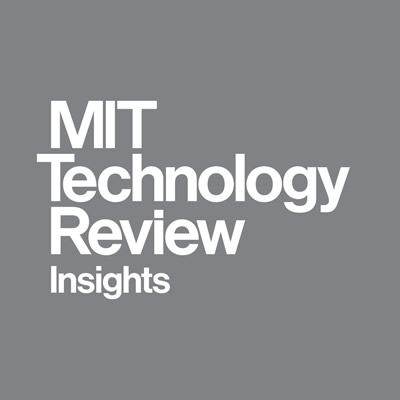

Photo: Greenery. Image credit: Tom Blackwell.
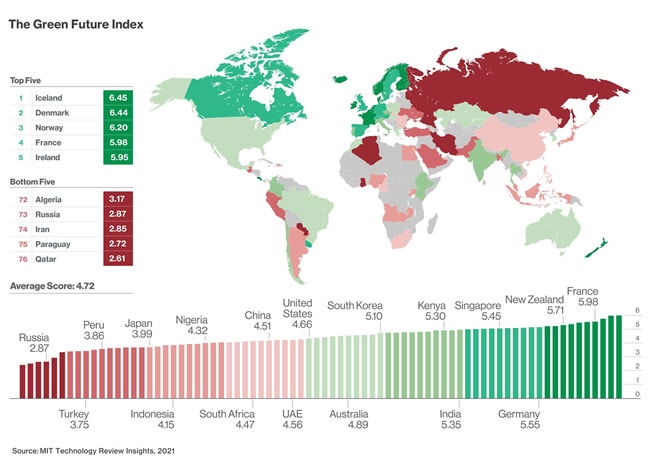
Photo: The MIT Green Future Index Rankings World Map.
CAMBRIDGE, Mass., Jan. 31, 2021 — The Green Future Index, a new study by MIT Technology Review Insights, in association with Citrix, Morgan Stanley, and Salesforce, ranks 76 countries and territories. The nations get ranked on the progress and commitment they are making toward a green future. The index indicates what they are doing to reduce carbon emissions, develop clean energy, innovate in green sectors, and the degree to which governments are implementing effective climate policies.
The MIT Technology Review index shows which countries are progressing fastest in global efforts to decarbonize and limit global heating in line with the Paris Agreement’s goals.
The key findings are as follows:
Europe will be a future green leader. Europe dominates the top of the index, with 15 European nations in the top 20. Many countries across the region have already made progress with curbing emissions, transitioning energy production to renewable sources, and investing in green mobility. Since covid, the EU has committed more than €200 billion in bold green economy investments, accelerating decarbonization even in the most fossil-fuel dependent states.
Iceland, Denmark, and Norway top the index. Iceland, in the first place, aims to be carbon neutral by 2040. The country has become a world leader in clean energy and carbon capture technology. Denmark (2nd) is the largest hydrocarbons producer in Europe to stop issuing new oil and gas exploration licenses. Norway (3rd) is also striving to decouple its economy from fossil fuels.
Costa Rica and New Zealand secure top 10 positions. Costa Rica ranked 7th, and New Zealand, ranked 8th, have made significant strides with renewables and have world-leading agendas for decarbonization across industry and agriculture. Canada (14th), Singapore (16th), and Uruguay (20th), the other non-Europeans in the top 20, have strategies for decarbonization, transitioning energy sources, and government-led initiatives to promote green living. For example, Singapore’s Zero Waste Masterplan aims to reduce landfill waste by 30% between now and 2030.
There is uneven progress across the world’s largest economies. The United States (40th) has reduced emissions over recent years and is responsible for nearly one-fifth of the world’s green patents. Yet, it is emerging from four years of climate denial and remains heavily dependent on fossil fuels and unsustainable farming practices. China (45th) is responsible for more than one-quarter of global emissions but has pledged to become carbon neutral by 2060 and is the world’s fastest-growing renewable energy producer. France (5th), Germany (11th), and Canada (14th) are the highest-ranked countries in the G20.
The countries at the bottom of the index risk losing competitiveness in the green economy. The laggards include South Africa (47th), Vietnam (49th), and Indonesia (57th), where economic pressures run counter to sustainable development. Japan (60th) aims to be carbon neutral by 2050, although government targets for renewable energy remain modest. The 16 “abstainer” countries at the bottom include petrostates such as Saudi Arabia, Iran, Qatar, and Russia. The latter’s Energy Strategy 2035 for expanding oil and gas production identified the trend toward carbon neutrality as an existential threat.
“Covid-19 has created a huge momentum for developing green industries and financing infrastructure that will be clean, technologically advanced, and climate-resilient,” says Nico Crepaldi, head of custom content, MIT Technology Review. “In the future, we’re likely to see ‘green’ being synonymous with economic competitiveness.”
• The Green Future Index Country Rankings
Source: MIT Technology Review Insights
|GlobalGiants.Com|
Edited & Posted by the Editor | 6:49 AM | View the original post
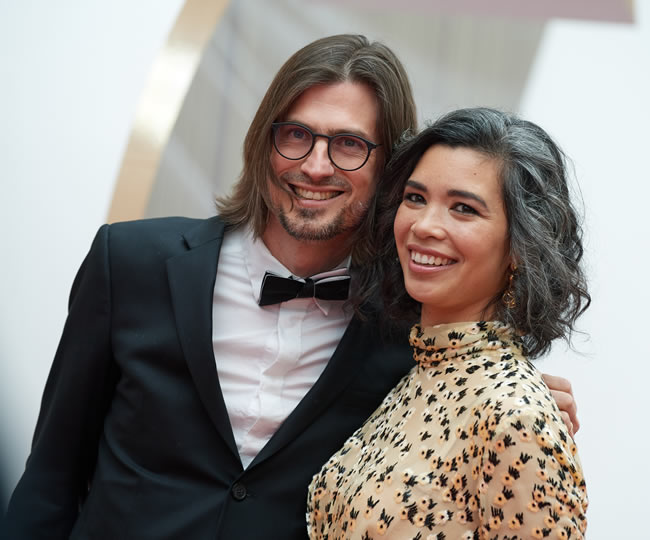
Photo: Oscar nominee Rosana Sullivan arrives on the red carpet of The 92nd Oscars at the Dolby Theatre in Hollywood, CA, on Sunday, February 9, 2020. Image provided by & copyright © A.M.P.A.S./ Matt Petit. [File Photo]

Photo: The cast and crew of “Corpus Christi” arrive on the red carpet of The 92nd Oscars at the Dolby Theatre in Hollywood, CA, on Sunday, February 9, 2020. Image provided by & copyright © A.M.P.A.S./ Valerie Durant. [File Photo]
LOS ANGELES, CA, January 28, 2021 — The Academy of Motion Picture Arts and Sciences today announced feature films eligible for consideration in the Animated Feature Film, Documentary Feature, and International Feature Film categories for the 93rd Academy Awards.
• ANIMATED FEATURE FILM
Twenty-seven features are eligible for consideration in the Animated Feature Film category for the 93rd Academy Awards. Some of the films have not yet had their required qualifying release and must fulfill that requirement and comply with all the category’s other qualifying rules to advance in the voting process.
• DOCUMENTARY FEATURE
Two hundred thirty-eight features are eligible for consideration in the Documentary Feature category for the 93rd Academy Awards. Some of the films have not yet had their required qualifying release and must fulfill that requirement and comply with all the category’s other qualifying rules to advance in the voting process.
Documentary features that have won a qualifying award or have been programmed at qualifying film festivals or submitted in the International Feature Film category as their country’s official selection are also eligible in the class. Films submitted in the Documentary Feature category may also qualify for Academy Awards in other categories, including Best Picture. Members of the Documentary Branch vote to determine the shortlist and the nominees. A shortlist of 15 films will be announced on Tuesday, February 9, 2021.
• INTERNATIONAL FEATURE FILM
Ninety-three countries have submitted films that are eligible for consideration in the International Feature Film category for the 93rd Academy Awards. An international feature film is a feature-length motion picture (more than 40 minutes) produced outside the United States with a predominantly (more than 50%) non-English dialogue track. Lesotho, Sudan, and Suriname are first-time entrants.
This year, the Academy’s Board of Governors voted to expand the shortlist from 10 to 15 films. Academy members from all branches can participate in the preliminary round of voting. They must meet a minimum viewing requirement to be eligible to vote in the category. The Academy would announce the shortlist of 15 films on Tuesday, February 9, 2021.
It would announce the Nominations for the 93rd Academy Awards on Monday, March 15, 2021.
The 93rd Oscars will be held on Sunday, April 25, 2021, and will be televised live on ABC and in more than 225 countries and territories worldwide.
93RD ACADEMY AWARDS
• FEATURE FILMS ELIGIBLE FOR CONSIDERATION IN THE INTERNATIONAL FEATURE FILM CATEGORY
Listed in alphabetical order by country
Source: The Academy of Motion Picture Arts and Sciences
|GlobalGiants.Com|
Edited & Posted by the Editor | 6:13 AM | View the original post
COVAX announced the signing of an advance purchase agreement for up to 40 million doses of the Pfizer-BioNTech vaccine; rollout to commence with the successful execution of supply agreements.
Additionally, COVAX announced that pending WHO emergency use listings, nearly 150 million doses of the AstraZeneca/Oxford candidate would be available in Q1 2021 via existing agreements with the Serum Institute of India (SII) and AstraZeneca.
COVAX is therefore on track to deliver at least 2 billion doses by the end of the year, including at least 1.3 billion amounts to 92 lower-income economies in the Gavi COVAX AMC.
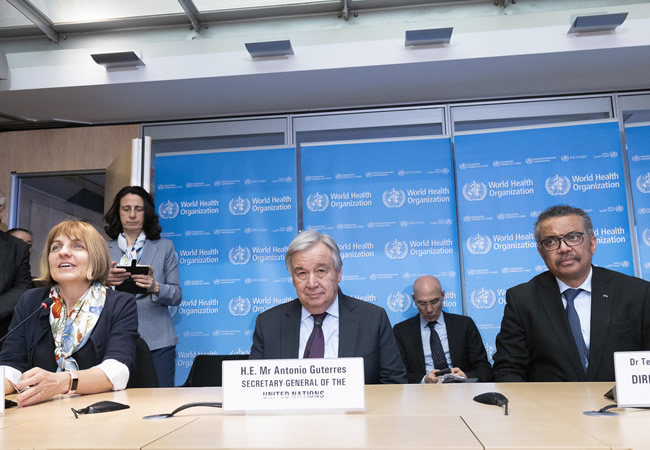
Photo: UN Secretary-General, António Guterres, with Tedros Adhanom Ghebreyesus, Director-General of World Health Organization (WHO), and Dr. Sylvie Briand, Director, Global Infections Hazard Preparedness of WHO, during a strategic briefing on COVID-19 at Strategic Health Operations Centre (SHOC) in the headquarters of WHO in Geneva. 24 February 2020. UN Photo / Jean-Marc Ferré.
Geneva/Oslo 22 January 2021 - COVAX, the global initiative to ensure rapid and equitable access to COVID-19 vaccines for all countries, regardless of income level, today announced the signing of an advance purchase agreement with Pfizer for up to 40 million doses of the Pfizer-BioNTech vaccine candidate, which has already received WHO emergency use listing. The rollout will commence with the successful negotiation and execution of supply agreements.
COVAX also confirmed that it would exercise an option via an existing agreement with India’s Serum Institute (SII). It would receive its first 100 million doses of the AstraZeneca/Oxford University-developed vaccine manufactured by SII.
Of these first 100 million doses, most are earmarked for delivery in the first quarter of the year, pending WHO Emergency Use Listing. The WHO review process, which is currently underway, follows approval for restricted use in emergencies by the Drugs Controller General of India earlier this month and is a critical aspect of ensuring that any vaccine procured through COVAX is fully quality assured for international use.
COVAX also anticipates that, via an existing agreement with AstraZeneca, at least 50 million further doses of the AstraZeneca/Oxford vaccine will be available for delivery to COVAX participants in Q1 2021, pending emergency use listing by WHO of the COVAX-specific manufacturing network for these doses. A decision on this candidate is also anticipated by WHO in February.
“Today marks another milestone for COVAX: pending regulatory approval for the AstraZeneca/Oxford candidate and pending the successful conclusion of the supply agreement for the Pfizer-BioNTech vaccine, we anticipate being able to begin deliveries of lifesaving COVID-19 vaccines by the end of February. It is not just significant for COVAX; it is a major step forward for equitable access to vaccines and an essential part of the global effort to beat this pandemic. We will only be safe anywhere if we are safe everywhere,” said Dr. Seth Berkley, CEO of Gavi, the Vaccine Alliance, which leads COVAX procurement and delivery.
Preparations, led by WHO, UNICEF, and Gavi, are already well underway for COVAX to deliver vaccines to economies eligible for support via the COVAX AMC, with Gavi making US$ 150 million available from its core funding as initial, catalytic support for preparedness and delivery.
“The urgent and equitable rollout of vaccines is not just a moral imperative, it’s also a health security, strategic and economic imperative,” said Dr. Tedros Adhanom Ghebreyesus, Director-General of the World Health Organization.
“Country Readiness Portal” will be launched by WHO this month, which will allow AMC participants to submit final national deployment and vaccination plans (NDVPs).
“These purchase agreements open the door for these lifesaving vaccines to become available to people in the most vulnerable countries,” said UNICEF Executive Director Henrietta Fore. “But at the same time we are securing vaccines, we must also ensure that countries are ready to receive them, deploy them, and build trust in them.”
The COVAX Facility intends to provide all 190 participating economies with an indicative allocation of doses by the end of this month. This indicative allocation will provide interim guidance to participants - offering a minimum planning scenario to enable preparations for the final portion of the number of doses each participant will receive in the first rounds of vaccine distribution.
COVAX, the vaccines pillar of the Access to COVID-19 Tools Accelerator (ACT), is co-led by CEPI, Gavi, and WHO, operating with vaccine manufacturers, UNICEF, the World Bank, and others. It is the only global initiative working with governments and manufacturers to ensure COVID-19 vaccines are available worldwide to both higher-income and lower-income countries.
The Access to COVID-19 Tools Accelerator (ACT) is a new, ground-breaking global collaboration to accelerate the development, production, and equitable access to COVID-19 tests, treatments, and vaccines. It was set up in response to a call from G20 leaders in March and launched by the WHO, European Commission, France, and The Bill & Melinda Gates Foundation in April 2020.
The World Health Organization (WHO) provides global leadership in public health within the United Nations system.
Source: World Health Organization (WHO)
|GlobalGiants.Com|
Edited & Posted by the Editor | 3:56 AM | View the original post
The Davos Agenda 2021 will convene under the theme: A Crucial Year to Rebuild Trust.
The World Economic Forum will gather the world’s foremost leaders to address the economic, environmental, social, and technological challenges following the COVID-19 pandemic.
More than 1,500 business, government, and civil society leaders from over 70 countries will set the agenda for a critical year ahead and discuss how to catalyze impact in the rapidly advancing Fourth Industrial Revolution.
The Davos Agenda week’s conclusions will feed into task forces working on global issues for the upcoming Special Annual Meeting in Singapore.
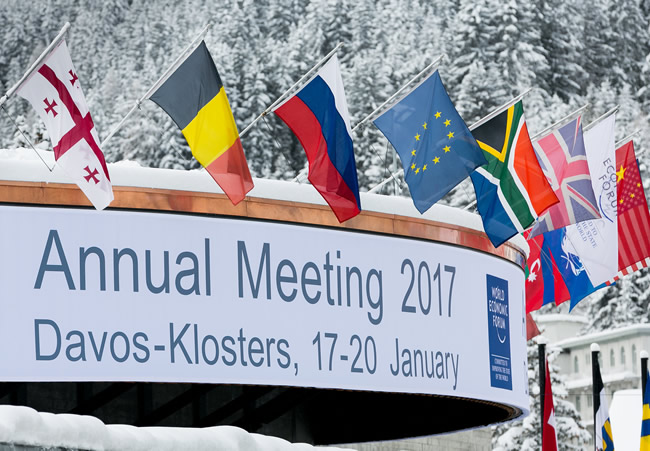
Photo: Impressions from the Annual Meeting 2017. The Conference Center from the outside. At the Annual Meeting 2017 of the World Economic Forum in Davos, January 15, 2017. Image provided by & copyright © World Economic Forum / Benedikt von Loebell. [File Photo]
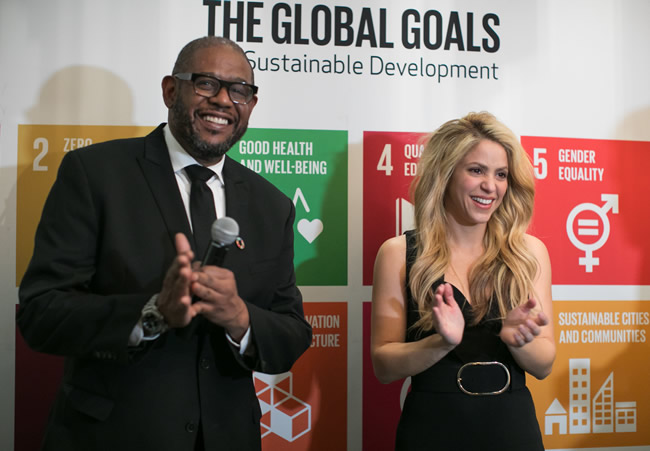
Photo: Actor Forest Whitaker and Popstar Shakira at the Media Welcome Reception at the Annual Meeting 2017 of the World Economic Forum in Davos, January 16, 2017. Image provided by & copyright © World Economic Forum / Ciaran McCrickard. [File Photo]
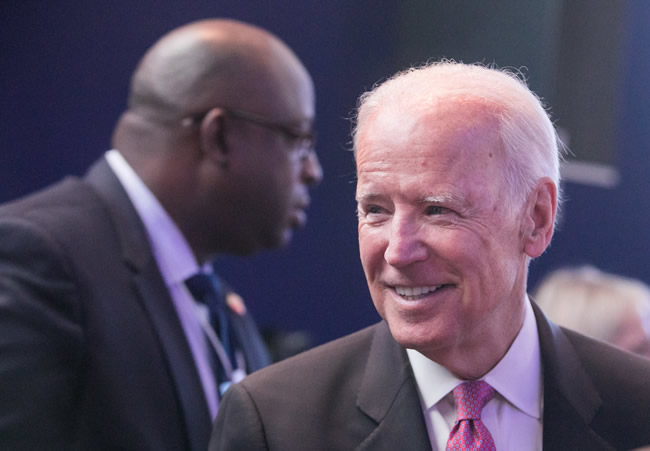
Photo: Joe Biden, Vice President of the United States at the Annual Meeting 2017 of the World Economic Forum in Davos, January 17, 2017. Image provided by & copyright © World Economic Forum / Ciaran McCrickard. [File Photo]

Photo: Opening Performance at the Annual Meeting 2018 of the World Economic Forum in Davos, January 22, 2018. Image provided by & copyright © World Economic Forum / Valeriano Di Domenico. [File Photo]
Geneva, Switzerland, January 18, 2021 - The World Economic Forum Davos Agenda, taking place virtually on 25-29 January, will bring together the world’s foremost leaders to address the new global situation. Heads of state and government, chief executives, and civil society leaders will convene under the theme: A Crucial Year to Rebuild Trust.
The meeting will create impact, rebuild Trust, and shape the policies and partnerships needed in 2021.
“In the context of the COVID-19 pandemic, the need to reset priorities and the urgency to reform systems have been growing stronger around the world,” said Klaus Schwab, Founder and Executive Chairman of the World Economic Forum. “Rebuilding trust and increasing global cooperation are crucial to fostering innovative and bold solutions to stem the pandemic and drive a robust recovery. This special meeting will be an opportunity for leaders to outline their vision and address the most important issues of our time, such as the need to accelerate job creation and to protect the environment.”
The COVID-19 pandemic has demonstrated that no institution or individual alone can address our complex, interdependent world’s economic, environmental, social, and technological challenges. The pandemic has accelerated systemic changes that were apparent before its inception. The fault lines that emerged in 2020 now appear as critical crossroads in 2021. The Davos Agenda will help leaders choose innovative and bold solutions to stem the pandemic and drive a robust recovery over the next year, the WEF announcement stated.
The five program themes are:
Designing cohesive, sustainable, resilient economic systems (January 25).
Driving responsible industry transformation and growth (January 26).
Enhancing the stewardship of the global commons (January 27).
Harnessing the technologies of the Fourth Industrial Revolution (January 28).
Advancing global and regional cooperation (January 29).
Addresses from G20 heads of state and government and international organizations will provide crucial insights into a range of essential issues in the year ahead. Participants will hear first-hand how these public figures will demonstrate leadership and drive action in areas such as the environment, jobs, and advances in innovation brought by the Fourth Industrial Revolution.
Heads of state and government include:
Many other world leaders may confirm later.
Leaders from international organizations, government agencies, and central banks include:
More than 1,000 leaders from the Forum’s member and partner organizations will represent the private sector. Seven of the top ten companies by market capitalization are engaged year-round with the Forum, and many will participate in The Davos Agenda week. As a working meeting to advance ongoing project work, more than 500 chief executives and chairpersons will participate in sessions throughout the week.
Leaders from civil society are a critical voice in shaping the agenda. Those taking part in the meeting include:
• Flagship reports, initiatives, and the latest book on Stakeholder Capitalism
On January 25, Professor Schwab will release his latest book, titled “Stakeholder Capitalism: A Global Economy that Works for Progress, People and Planet.”
The World Economic Forum will release its Global Risks Report 2021 on January 19. The flagship report is an important marker for prioritizing public and private sectors in the year ahead.
The Davos Agenda will also mark the launch of several World Economic Forum initiatives to accelerate the race to net-zero emissions, champion new standards for racial justice, develop artificial intelligence ethically in the global public interest, and close the digital divide.
The official program of The Davos Agenda will begin on January 25.
Source: World Economic Forum
|GlobalGiants.Com|
Edited & Posted by the Editor | 2:33 PM | View the original post
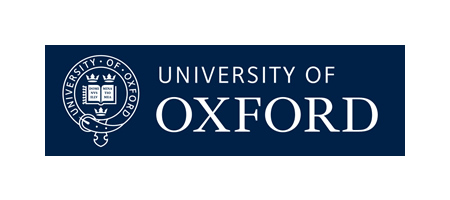
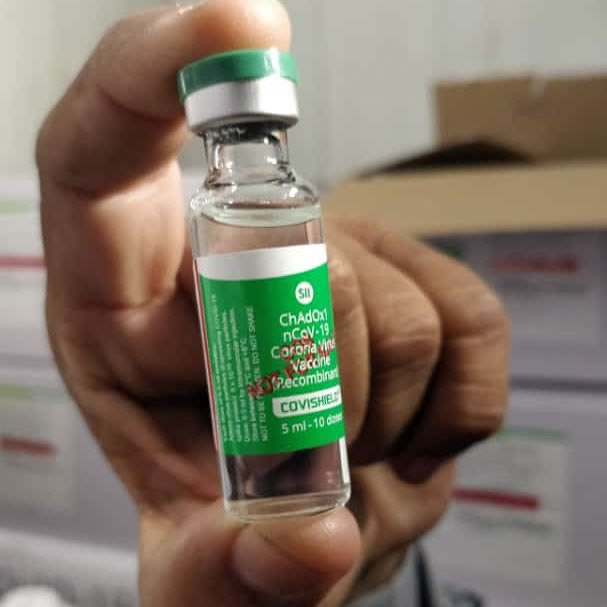
• UPDATE.
• January 16, 2021.
Prime Minister Narendra Modi of India launched the pan India rollout of the COVID-19 vaccination drive via video conferencing. It is the world’s most extensive vaccination program covering the entire length and breadth of the country.
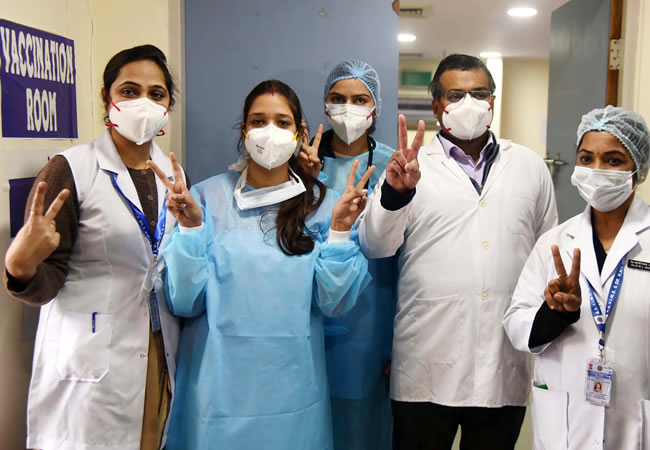
Photo: Health care workers celebrate the 1st phase of the pan India rollout of COVID-19 vaccination drive at Dr. Ram Manohar Lohia Hospital, New Delhi, on January 16, 2021.
• January 09, 2021.
• Oxford Vaccine: India starts Vaccination on January 16, 2021, with Priority to Healthcare & Frontline Workers followed by those above 50 Years and Under-50 with Co-morbidities.

Prime Minister Modi reviews the status of COVID-19 and preparedness for COVID19 vaccination.
The vaccination drive would kick off on January 16, 2021, after the forthcoming festivals, including Lohri, Makar Sankranti, Pongal, and Magh Bihu.
Priority will be given to the healthcare workers and the frontline workers, estimated to be around three crores in number.
They would be followed by those above 50 years of age and the Under-50 population groups with Co-morbidities, numbering around 27 crores.
New Delhi, January 09, 2021 — Prime Minister Modi chaired a high-level meeting to review the status of COVID-19 in the country and the preparedness of the State/UTs for COVID vaccination today.
The Prime Minister took a detailed and comprehensive review of COVID management’s status, covering various issues.
The Prime Minister reviewed the center’s preparedness status in close collaboration with the State and UT Governments for the vaccine’s roll-out soon.
According to the India Ministry of Health and Family Welfare, the vaccination exercise comprises the principles of people’s participation (Jan Bhagidari); utilizing the experience of elections (booth strategy) and Universal Immunization Program (UIP); no compromise of existing healthcare services, especially national programs and primary health care; no compromise on scientific and regulatory norms, other SOPs; and an orderly and smooth implementation driven by technology.
The roll-out of the COVID-19 vaccine will prioritize healthcare and frontline workers. They are estimated to be around three crores, followed by those above 50 years of age and the under-50 population groups with co-morbidities, numbering about 27 crores.
The Prime Minister got apprised about the Co-WIN Vaccine Delivery Management System. The unique digital platform will provide real-time information on vaccine stocks, their storage temperature, and individualized tracking of the COVID-19 vaccine beneficiaries. This platform will assist the program managers across all levels through automated session allocation for pre-registered beneficiaries, their verification, and generating a digital certificate upon completing the vaccine schedule.
The vaccinators and vaccine administrators comprise a crucial pillar of the vaccination exercise. Two thousand three hundred sixty participants were trained during the national level Training of Trainers, including state immunization officers, cold chain officers, IEC officials, and development partners. More than 61,000 program managers, 2 lakh vaccinators, and 3.7 lakh other vaccination team members have trained so far as part of training at States, Districts, and Block levels, the Health Ministry elaborated.
After the detailed review, the Government of India decided that because of the forthcoming festivals, including Lohri, Makar Sankranti, Pongal, and Magh Bihu, the COVID19 vaccination will start on January 16, 2021.
• January 03, 2021.
• People of India receive their New Year Gift; Prime Minister Modi congratulates the Nation as Drugs Controller General of India approves the Oxford Vaccine for emergency use; The University of Oxford welcomes Regulatory Authorisations.

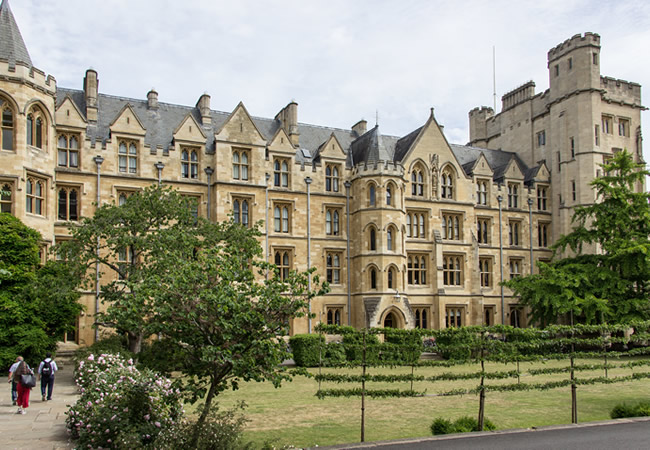
Photo: St. Mary’s College, University of Oxford, Oxford. Image Credit: Billy Wilson.
Oxford / New Delhi, January 03, 2021 — The Drugs Controller General of India today approved the Oxford Vaccine for emergency use. Prime Minister Narendra Modi congratulated the nation and called it a decisive turning point to strengthen a spirited fight against Corona. The approval accelerates the road to a healthier and COVID-free country, he added.
India’s Home Minister Amit Shah hailed the approval of the COVID-19 vaccine granted by the Drugs Controller General of India (DGCI) today. He said the permission to ‘Made in India’ vaccines would prove to be a game-changer. It is a momentous achievement for India, he remarked.
The Serum Institute of India, Pune, is the manufacturing partner of the vaccine candidate named Covishield, developed jointly by the University of Oxford’s Jenner Institute and AstraZeneca.
The Serum Institute of India had selected 17 sites in India to conduct the trial. A total of 1,600 candidates took part in the study.
• The University of Oxford welcomes Regulatory Authorisations:
Meanwhile, the University of Oxford has welcomed the news that the UK Government has accepted the recommendation from the Medicines and Healthcare products Regulatory Agency (MHRA) to authorize the emergency use of the coronavirus vaccine in the UK.
Professor Andrew Pollard, Director of the Oxford Vaccine Group and Chief Investigator of the Oxford Vaccine Trial, said:
‘The regulator’s assessment that this is a safe and effective vaccine is a landmark moment, and an endorsement of the huge effort from a devoted international team of researchers and our dedicated trial participants.’
‘Though this is just the beginning, we will start to get ahead of the pandemic, protect health and economies when the vulnerable are vaccinated everywhere, as many as possible, as soon as possible.’
Professor Sarah Gilbert, Professor of Vaccinology at the University of Oxford, said:
‘This is a day for the team developing the vaccine to celebrate, after a year of tough work under difficult circumstances. The first authorization or use of the vaccine outside of clinical trials has been granted. We still have more to do and will continue to provide more data to multiple regulatory authorities until we can see the vaccine being used to save lives around the world.’
The Oxford vaccine is stable, easily manufactured, transported, and stored at domestic fridge temperature (2-8 degrees C). It can be easily administered in existing healthcare settings, allowing its rapid deployment.
Oxford University’s collaboration with AstraZeneca has been crucial to the successful development of the vaccine and vital for its global manufacturing and distribution across the world. AstraZeneca already has international agreements to supply three billion doses of the vaccine, with access through more than 30 supply agreements and partner networks.
A key element of Oxford’s partnership with AstraZeneca is the joint commitment to provide the vaccine on a not-for-profit basis for the duration of the pandemic across the world and in perpetuity to low- and middle-income countries.
Professor Louise Richardson, Vice-Chancellor at the University of Oxford, said:
‘This is a great day for British science and a great day for universities everywhere. Above all, it is a great day for the many people whose lives will be saved by this vaccine. We are greatly indebted to those who have designed, developed, manufactured, and evaluated it.’
Sources: Prime Minister’s Office, New Delhi. The University of Oxford.
|GlobalGiants.Com|
— The editor holds an Oxford Alumni Card and is a member of the ‘Oxford and Cambridge Society of India.’
Edited & Posted by the Editor | 6:03 AM | View the original post
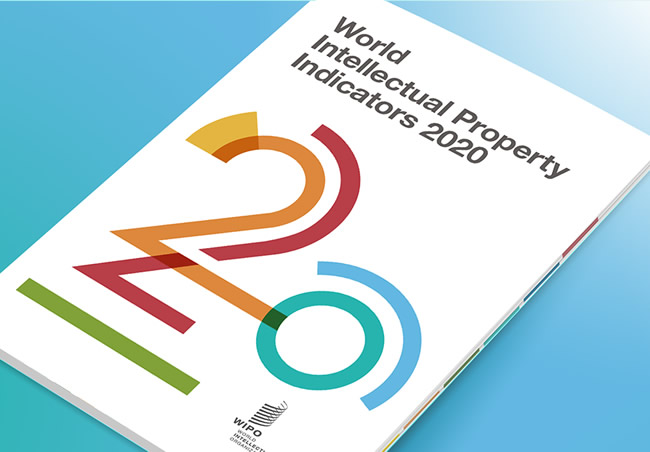
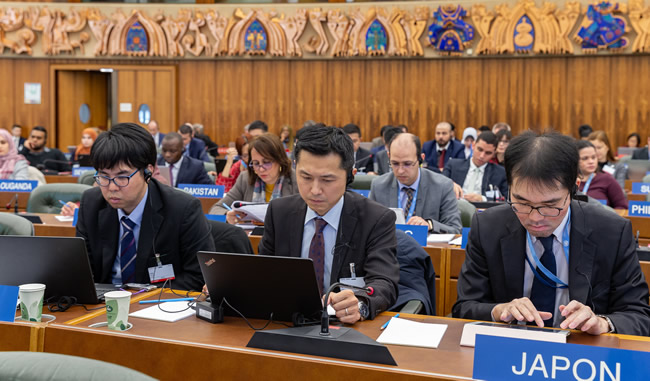
Photo: The Thirty-First Session of WIPO’s Standing Committee on the Law of Patents (SCP) took place in Geneva, Switzerland, from December 2 to December 5, 2019. Image provided by & copyright © WIPO. Photographer: Emmanuel Berrod.
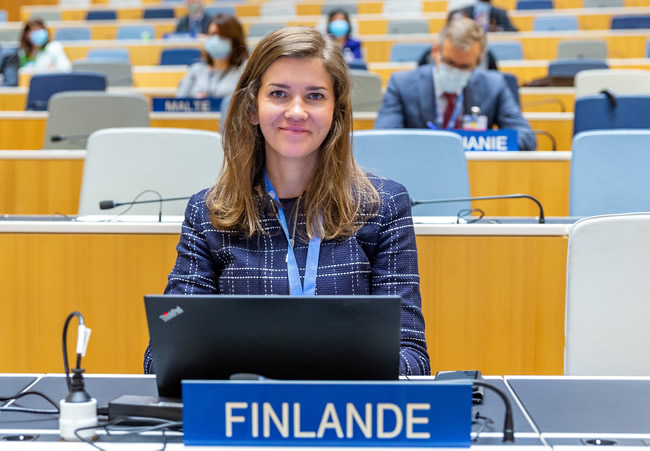
Photo The Delegate of Finland at the Opening of the WIPO Assemblies 2020. The Sixty-First Series of Meetings of the Assemblies of WIPO Member States took place in Geneva, Switzerland, from September 21 to 25, 2020. Image provided by & copyright © WIPO. Photographer: Emmanuel Berrod.
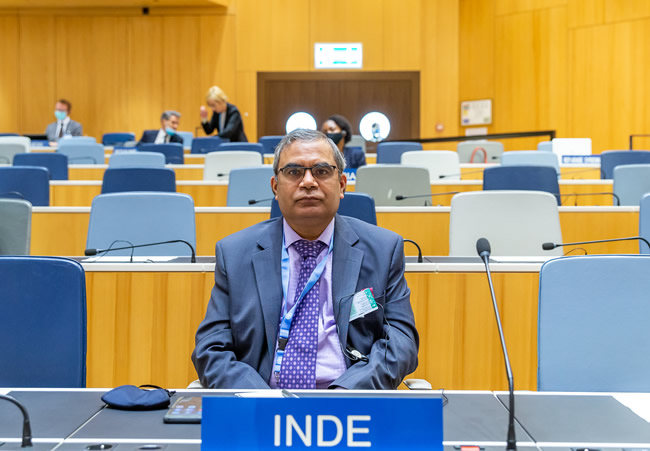
Photo The Delegate of India at the Opening of the WIPO Assemblies 2020. The Sixty-First Series of Meetings of the Assemblies of WIPO Member States took place in Geneva, Switzerland, from September 21 to 25, 2020. Image provided by & copyright © WIPO. Photographer: Emmanuel Berrod.
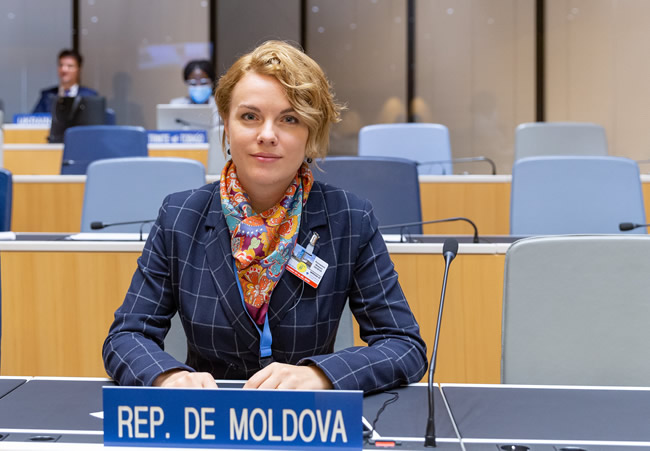
Photo The Delegate of Moldova at the Opening of the WIPO Assemblies 2020. The Sixty-First Series of Meetings of the Assemblies of WIPO Member States took place in Geneva, Switzerland, from September 21 to 25, 2020. Image provided by & copyright © WIPO. Photographer: Emmanuel Berrod.
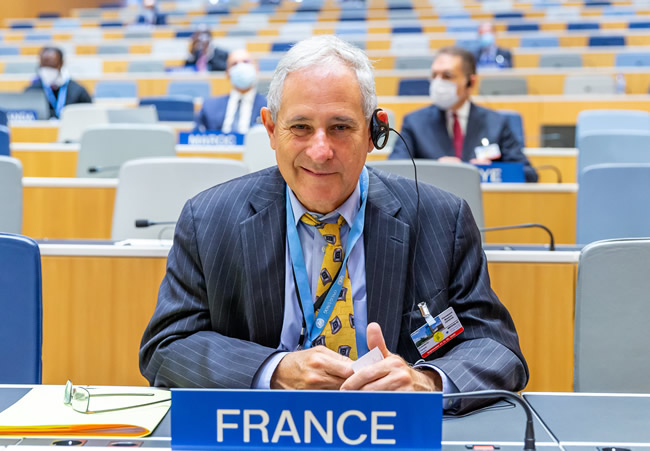
Photo The Delegate of France at the Opening of the WIPO Assemblies 2020. The Sixty-First Series of Meetings of the Assemblies of WIPO Member States took place in Geneva, Switzerland, from September 21 to 25, 2020. Image provided by & copyright © WIPO. Photographer: Emmanuel Berrod.
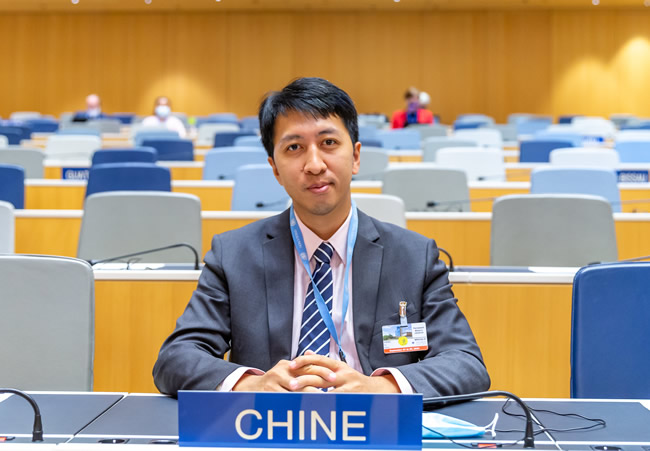
Photo The Delegate of China at the Opening of the WIPO Assemblies 2020. The Sixty-First Series of Meetings of the Assemblies of WIPO Member States took place in Geneva, Switzerland, from September 21 to 25, 2020. Image provided by & copyright © WIPO. Photographer: Emmanuel Berrod.
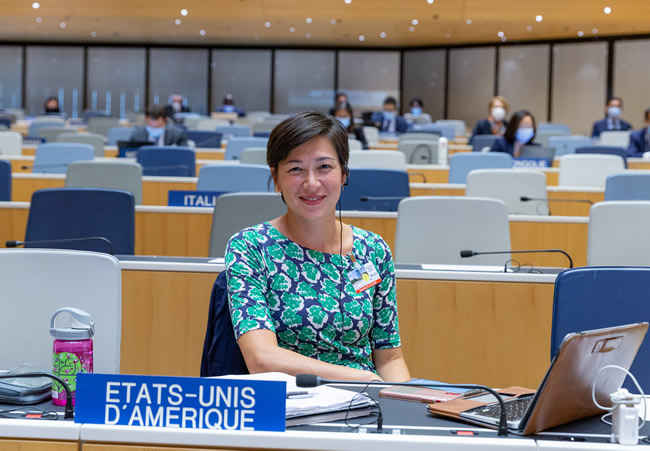
Photo The Delegate of USA at the Opening of the WIPO Assemblies 2020. The Sixty-First Series of Meetings of the Assemblies of WIPO Member States took place in Geneva, Switzerland, from September 21 to 25, 2020. Image provided by & copyright © WIPO. Photographer: Emmanuel Berrod.
Geneva, Switzerland — Worldwide trademark and industrial design-creation activity rose in 2019 even as the number of global patent applications dipped slightly on weaker demand in IP powerhouse China, WIPO’s benchmark World Intellectual Property Indicators (WIPI) report showed.
Trademark and industrial design filing activity increased by 5.9% and 1.3%, respectively. A 3% decline in global patent applications, the first fall in a decade, was driven by a drop in filings by Chinese residents. Excluding China, international patent filings rose 2.3%.
The annual WIPI report collects and analyzes IP data from some 150 national and regional offices to inform policymakers, business leaders, investors, academics, and others seeking macro trends in innovation and creativity.
The WIPI’s 2019 figures, which pre-date the COVID-19 pandemic, underline the long-building growth in demand for the intellectual property tools that incentivize an increasingly global and digital-focused economy, said WIPO Director General Daren Tang.
“The robust use of intellectual property tools shows high levels of innovation and creativity at the end of 2019, just at the onset of the COVID-19 pandemic,” said Mr. Tang. “The pandemic has accelerated long-building trends by fostering the adoption of new technologies and accelerating the digitization of everyday life. Because IP is so connected to technology, innovation, and digitalization, IP will become even more important to a greater number of countries in the post-COVID world.”
World Intellectual Property Indicators - 2020
(An authoritative annual survey of IP activity around the globe)
• Patents
China’s IP office received 1.4 million patent applications in 2019, more than twice the amount received by authorities in the second-busiest country, the United States (621,453). The U.S. was followed by Japan (307,969), the Korean Intellectual Property Office (KIPO; 218,975), and the European Patent Office (EPO; 181,479). Together, these five offices accounted for 84.7% of the world total.
Among the top five offices, the Republic of Korea (+4.3%), the EPO (+4.1%), and the U.S. (+4.1%) recorded growth in applications, while both China (-9.2%) and Japan (-1.8%) saw declines.
Filings in China declined for the first time in 24 years due to a 10.8% drop in resident applications amidst an overall shift in regulations there, aiming to optimize application structures and improve applications’ quality.
Germany (67,434), India (53,627), Canada (36,488), the Russian Federation (35,511) and Australia (29,758) also featured among the top 10 offices. These offices saw mixed performance. Canada (+0.9%) and India (+7.1%) exhibited growth in filings in 2019, while Australia (-0.7%), Germany (-0.7%), and the Russian Federation (-6.4%) recorded declines.
Offices located in Asia received close to two-thirds (65%) of all applications filed worldwide in 2019 - a considerable increase from 50.9% in 2009 - primarily driven by long-term growth in China. Offices located in North America accounted for just over one-fifth (20.4%) of the world total, while those in Europe accounted for slightly above one-tenth (11.3%). The combined share of offices located in Africa, Latin America, and the Caribbean, and Oceania was 3.3% in 2019.
In terms of filing abroad, which indicates a desire to expand in new markets, U.S. residents continue to lead with 236,032 equivalent patent applications filed abroad in 2019. The U.S. was followed by Japan (206,758), Germany (104,736), China (84,279), and the Republic of Korea (76,824).
Patents in force worldwide grew by 7% to reach around 15 million in 2019. The highest number of patents in force was recorded in the U.S. (3.1 million), followed by China (2.7 million) and Japan (2.1 million). More than half of all patents in force in the U.S. originate from abroad, while domestic applicants accounted for around four-fifths of all patents in force in Japan.
• Trademarks
An estimated 11.5 million trademark applications covering 15.2 million classes were filed worldwide in 2019. The number of types specified in applications grew by 5.9% in 2019, marking a 10th successive growth year.
China’s IP office had the highest volume of filing activity[1] with a class count of around 7.8 million; followed by the IP offices of the U.S. (672,681) and Japan (546,244); the IP office of the Islamic Republic of Iran (454,925) and the European Union Intellectual Property Office (EUIPO; 407,712).
Among the top 20 offices, the largest increases between 2018 and 2019 were in the IP offices of Brazil (+22.3%), Viet Nam (+19.3%), the Islamic Republic of Iran (+18.4%), the Russian Federation (+16.5%), and Turkey (+15.5%).
Offices located in Asia accounted for 70.6% of all trademark filing activity in 2019, up from 38.7% in 2009. Europe’s share declined from 36% in 2009 to 15.4% in 2019. North America accounted for 5.7% of the world total in 2019, while the combined share of offices located in Africa, Latin America, and the Caribbean, and Oceania was 8.3% in 2019.
There were an estimated 58.2 million active trademark registrations worldwide in 2019 - up 15.2% in 2018, with 25.2 million in China alone, followed by 2.8 million in the U.S. and 2 million in India.
• Industrial Designs
An estimated 1.04 million industrial design applications containing 1.36 million designs were filed worldwide in 2019, representing a 1.3% year-on-year increase. China’s IP office received applications containing 711,617 procedures in 2019, corresponding to 52.3% of the world total. It was followed by the EUIPO (113,319) and the IP offices of the Republic of Korea (69,360), the U.S. (49,848), and Turkey (46,202).
Among the top 20 offices, the following three offices reported double-digit growth in design counts: the Russian Federation (+22%), the Islamic Republic of Iran (+19.3%), and Australia (+10.3%).
Offices located in Asia accounted for more than two-thirds (68.4%) of all designs in applications filed worldwide in 2019, followed by Europe (24.3%) and North America (4.2%). The combined share of Africa, Latin America and the Caribbean, and Oceania was 3.1% in 2019.
Designs related to furnishings accounted for 9.4% of global filing activity[2], followed by those related to clothing (8.1%) and packages and containers (7.3%).
The total number of industrial design registrations in force worldwide grew by 7.3% to reach around 4.1 million. The largest number of registrations was in China (1.8 million), followed by the Republic of Korea (358,803), the U.S. (357,959), and Japan (261,669).
• Plant Varieties
China’s relevant office received 7,834 plant variety applications in 2019, up 36% in 2018. It now accounts for over one-third of the plant variety applications filed worldwide. China was followed by the Community Plant Variety Office of the European Union (CPVO; 3,525) and relevant offices of the U.S. (1,590), Ukraine (1,238), and Japan (822). Among the top five offices, China (+36%) and Ukraine (+1.1%) saw growth in filings 2019, while Japan (-6.6%), the U.S. (-1.2%), and CPVO (-0.8%) saw a drop in filings.
• Geographical Indications
In 2019, there were around 55,800 GIs in force worldwide. GIs are signs used on products with a specific geographical origin and possess qualities or a reputation due to that origin, such as Gruyère for cheese or Tequila for spirits. Germany (14,289) reported the largest number of GIs in force, followed by China (7,834), Hungary (6,494), and the Czech Republic (6,071).
GIs in force relating to “wines and spirits” accounted for around 56.6% of the 2019 world total, followed by agricultural products and foodstuffs (34.2%) and handicrafts (3.5%).
• Publishing Industry
Revenue generated by the trade and the educational sectors of the publishing industry of 21 countries amounted to USD 67.3 billion in 2019. The U.S. (USD 23.5 billion) reported the most considerable net revenue, followed by Japan (USD 16.1 billion), the Republic of Korea (USD 6.2 billion), Germany (USD 5.6 billion), the U.K. (USD 5.4 billion), and France (USD 3 billion).
Online sales generated more than half of total trade sector revenue in Sweden (50.1%) and the U.K. (55.2%). The U.S. (43.5%) and Turkey (22%) also had a large proportion of their total trade sector revenue generated by online sales.
The U.K. reported a combined total of around 202,000 published titles covering the trade and educational sectors in 2019. It was followed by the Russian Federation (115,171), France (107,143), Italy (100,266), and Spain (95,849).
The World Intellectual Property Organization (WIPO) is the global forum for intellectual property policy, services, information, and cooperation. A specialized agency of the United Nations, WIPO assists its 193 member states in developing a balanced international IP legal framework to meet society’s evolving needs. It provides business services for obtaining IP rights in multiple countries and resolving disputes. It delivers capacity-building programs to help developing countries benefit from using IP. And it offers free access to unique knowledge banks of IP information.
Source: The World Intellectual Property Organization (WIPO)
|GlobalGiants.Com|
(The Editor is an Alumnus of the World Intellectual Property Organization Academy (WIPO Academy), Geneva, Switzerland.)
Edited & Posted by the Editor | 8:49 AM | View the original post

Photos: Barns - Pane of four stamps showing different barns. At the bottom of each stamp is the word “postcard.” “USA” is stacked vertically and printed at the top on the left-hand or right-hand side. Castillo de San Marcos - The stamp shows the Florida fortress’s digital image, with its name at the bottom and the value in the upper right-hand corner.
WASHINGTON, Jan. 13, 2021 — The U.S. Postal Service will release three new stamps as part of the 2021 price change: Barns, a 36-cent postcard stamp; Brush Rabbit, a 20-cent additional ounce stamp; and Castillo de San Marcos, a $7.95 Priority Mail stamp.
• Barns
The U.S. Postal Service has four new postcard stamps that celebrate the beauty and history of American barns. The artist created digital paintings of four types of iconic barns found in the rural American landscape. With differing qualities of light and color, each piece reflects one of the four seasons:
Ashley Walton designed the stamps with original artwork by Kim Johnson. Greg Breeding was the art director.
• Castillo de San Marcos
The latest Priority Mail stamp, which bears the new price, celebrates the oldest masonry fortification in the United States, the Castillo de San Marcos in St. Augustine, FL.
The stamp art features a digital illustration of the fortress based on a contemporary photograph. With a view toward the fort’s northeast corner, the artwork captures it in the golden glow of sunrise over Matanzas Bay. Art director Greg Breeding designed the stamp with art created by Chicago-based graphic illustrator Dan Cosgrove.
Source: U.S. Postal Service
|GlobalGiants.Com|
Edited & Posted by the Editor | 8:49 AM | View the original post
Auckland, the first global city in the world, welcomes 2021. Happy New Year!
A special pre-midnight moment allows Kiwis to acknowledge what they have been achieved together this year and the kindness and resilience of New Zealanders through 2020.
At midnight, spectacular coordinated fireworks and lighting displays from the city’s landmarks: Vector Lights on the Auckland Harbour Bridge, Skycity’s fireworks from the Sky Tower, Auckland Museum, and The LightPath.

PHOTO: AUCKLAND, NEW ZEALAND - DECEMBER 31: Halo performs during Auckland New Year’s Eve celebrations on December 31, 2020, in Auckland, New Zealand. (Photo by Fiona Goodall/Getty Images for Auckland Unlimited).

PHOTO: AUCKLAND, NEW ZEALAND - JANUARY 01, 2021: Fireworks from the SkyTower during Auckland New Year’s Eve celebrations on January 01, 2021, in Auckland, New Zealand. (Photo by Dave Rowland/Getty Images for Auckland Unlimited).

PHOTO: AUCKLAND, NEW ZEALAND -JANUARY 01, 2021: Fireworks from the SkyTower during Auckland New Year’s Eve celebrations on January 01, 2021, in Auckland, New Zealand. (Photo by Dave Rowland/Getty Images for Auckland Unlimited).

PHOTO: AUCKLAND, NEW ZEALAND -JANUARY 01, 2021: Fireworks from the SkyTower during Auckland New Year’s Eve celebrations on January 01, 2021, in Auckland, New Zealand. (Photo by Dave Rowland/Getty Images for Auckland Unlimited).

Photo: AUCKLAND, NEW ZEALAND - JANUARY 01, 2021: Fireworks from the SkyTower and a light display from the Harbour Bridge during Auckland New Year’s Eve celebrations on January 01, 2021, in Auckland, New Zealand. (Photo by Dave Rowland/Getty Images for Auckland Unlimited).

Photo: AUCKLAND, NEW ZEALAND - JANUARY 01, 2021: Jordan Luck performs during Auckland New Year’s Eve celebrations on January 01, 2021, in Auckland, New Zealand. (Photo by Fiona Goodall/Getty Images for Auckland Unlimited).
Source: Auckland Unlimited
|GlobalGiants.Com|
Happy New Year, New Zealand! Auckland welcomes in 2021 with celebratory fireworks.
Edited & Posted by the Editor | 8:02 AM | View the original post

Season’s Greetings!
Best Wishes for 2021!
|GlobalGiants.Com|
Edited & Posted by the Editor | 10:42 AM | View the original post
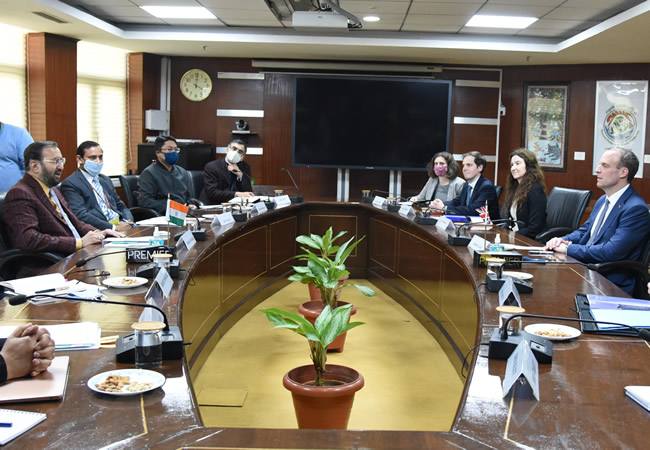
Photo: UK Foreign Secretary Dominic Raab meets India’s Environment Minister Prakash Javadekar. Image provided by the Foreign, Commonwealth & Development Office, London.
London/New Delhi, December 16, 2020 — Experts from India and the UK will join forces through a new virtual hub to deliver vaccines for coronavirus and other deadly viruses, UK Foreign Secretary Dominic Raab announced in India Wednesday, December 16.
The UK Foreign Secretary met Prime Minister Modi to discuss the UK and India working together as a force for good and launching the pioneering new vaccines hub, which will share best practice for regulation and clinical trials, and foster innovation. He also visited a Delhi health clinic that will administer Oxford/AstraZeneca vaccines.
India’s Serum Institute is poised to make over a billion doses of the coronavirus vaccine developed by Oxford University and AstraZeneca. Unlike other vaccines, it can be stored at average fridge temperatures, making it easier and cheaper to produce and keep - and distribute worldwide.
Foreign Secretary Dominic Raab said:
“This Serum Institute and Oxford University partnership demonstrates the UK-India relationship at its best: a vaccine developed in the UK and made in India, drawing our brightest minds together to save lives as a global force for good.
“A global pandemic requires a global solution. Scientific cooperation has made breakthroughs on coronavirus vaccines at a record-breaking pace, and the UK-India Vaccine Hub will now build on these innovations, to bring this crisis to an end and protect us all against future pandemics.”
Millions of the doses made by the Serum Institute will be distributed to the world’s poorest people via the global COVAX initiative, in partnership with the World Health Organization (WHO) and Gavi, the vaccine alliance.
The UK has championed equitable access to any coronavirus vaccine for those who need it. It has committed up to £619 million to COVAX to secure both the UK’s access to coronavirus vaccines and distribute COVID-19 vaccines worldwide.
The new hub will enable British and Indian experts to share knowledge on clinical trials and regulatory approvals and get vaccines to people who need them most in a safe, secure, and energy-efficient way.
It will protect the UK and India by enhancing cooperation on the development and distribution of coronavirus vaccines, better aligning the international regulation of vaccines, and fostering partnerships to develop innovation ‘moonshots’ that can define vaccine delivery over the next decade and beyond.
During his meeting with Prime Minister Modi, the Foreign Secretary signaled his ambition for a closer UK-India relationship.
The Foreign Secretary also met Minister for Education Ramesh Pokhriyal.
Source: Foreign, Commonwealth & Development Office, London.
|GlobalGiants.Com|
Edited & Posted by the Editor | 5:59 AM | View the original post
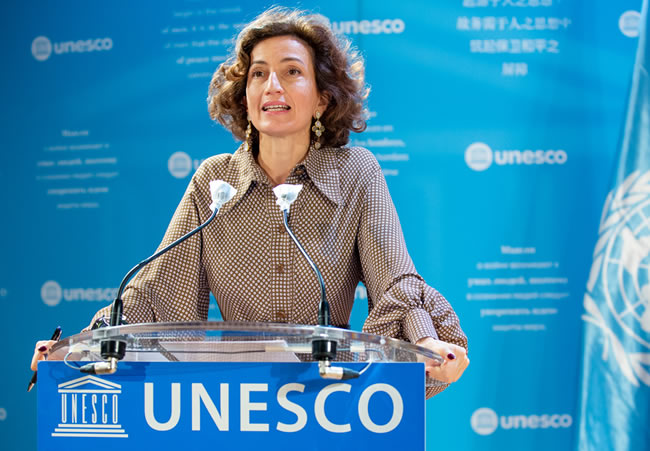
Photo: UNESCO Director-General Audrey Azoulay speaking at the 15th session of the Intergovernmental Committee of the UNESCO Convention for the Safeguarding of the Intangible Cultural Heritage. December 14, 2020. Image provided by & copyright © UNESCO / Christelle ALIX.
Paris, December 14, 2020 — As countries begin to administer COVID-19 vaccines, UNESCO and Education International, the global federation of education unions, call on governments and the international community to consider teachers and school personnel priority group in vaccination efforts.
“Reopening schools and education institutions safely and keeping them open as long as possible is an imperative,” said UNESCO Director-General Audrey Azoulay and Education International’s General Secretary David Edwards in the joint video message.” In this context, as we see positive developments regarding vaccination, we believe that the governments must consider teachers and education support personnel as a priority group.”
Educational disruptions impacted over 100 million teachers and school personnel due to the COVID-19 crisis around the world. UNESCO’s latest data indicates that schools remain fully closed in 27 countries affecting over 300 million learners. Closures harm students’ learning, safety, and well-being, affecting the most vulnerable students the hardest. It also brings adverse social and economic consequences to societies.
The message, released on the 60th anniversary of the Convention that promotes the right to education, praises teachers for their dedication throughout school closures. “When schools and education institutions closed, teachers and support personnel remained on the frontline. They reinvented the way we teach, the way we learn. They supported their students - too often with no training or adequate tools.”
In the Global Education Meeting convened by UNESCO in October 2020, heads of state and ministers committed to supporting all teachers and education personnel as frontline workers and prioritizing students and educators’ health and safety.
Source: UNESCO
|GlobalGiants.Com|
Teachers and school personnel must be a priority group in COVID-19 vaccination efforts — UNESCO and Education International.
Edited & Posted by the Editor | 2:58 PM | View the original post
2020 TIME PERSON OF THE YEAR: JOE BIDEN & KAMALA HARRIS
CHANGING AMERICA’S STORY
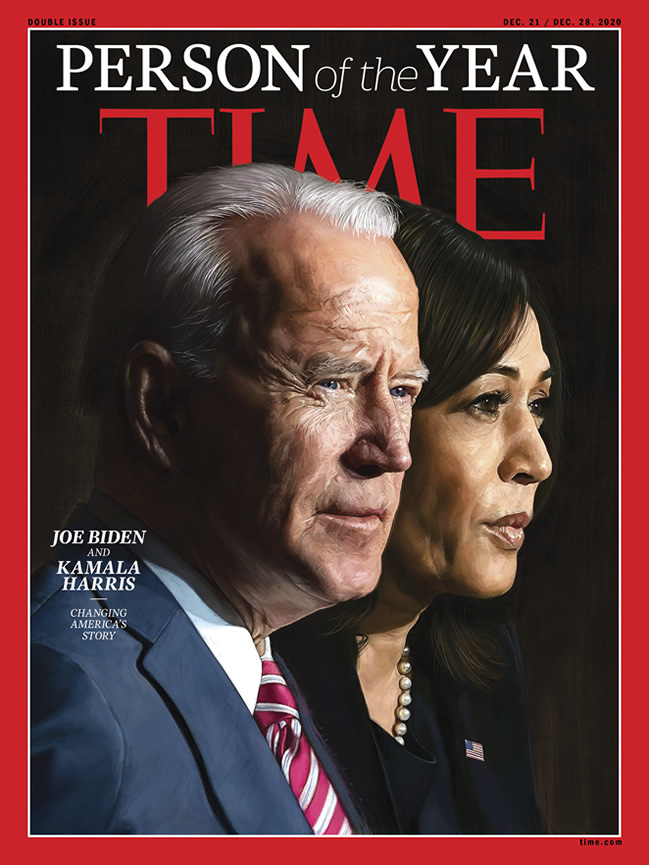
NEW YORK, December 11, 2020 — Today, TIME names Joe Biden and Kamala Harris, President-elect, and Vice President-elect of the United States, as the 2020 Person of the Year.
TIME Editor-in-Chief and CEO Edward Felsenthal write, “For changing the American story, for showing that the forces of empathy are greater than the furies of division, for sharing a vision of healing in a grieving world, Joe Biden and Kamala Harris are TIME’s 2020 Person of the Year.”
Felsenthal continues, “Joe Biden was elected President of the United States amid an existential debate over what reality we inhabit. Perhaps the only thing Americans agree on right now is that the country’s future is at stake, even as they fiercely disagree about why…. The task before the new Administration is immense: a pandemic to confront, an economy to fix, a climate crisis to tackle, alliances to rebuild, deep skepticism to overcome with many Americans dubious about unity with Trump voters, and an opposition party still very much under Trump’s sway…. This will be the test of the next four years: Americans who haven’t been this divided in more than a century elected two leaders who have bet their success on finding common ground.”
Kamala Harris is the first Vice President to be included in the choice for Person of the Year. Felsenthal writes: “TIME from its beginnings has had a special connection to the presidency, as a reflection of America and its role in the world. Every elected President since FDR has at some point during his term been a Person of the Year, nearly a dozen of those in a presidential election year. This is the first time we have included a Vice President. In a year that saw an epic struggle for racial justice, and one of the most consequential elections in history, the Biden-Harris partnership sends a powerful message.”
In his letter to readers, Felsenthal writes, “The selection of Person of the Year is rarely easy, and this year was far more difficult than most… In Joe Biden and Kamala Harris, we have two individuals whose election mirrored and moved the major stories of this year and whose fates will shape the nation’s role in the world and the future of the American experiment.”
In the cover story, TIME’s Charlotte Alter writes, “Biden had the vision, set the tone and topped the ticket. But he also recognized what he could not offer, what a 78-year-old white man could never provide: a bridge to the future. For that, he needed Kamala Harris: California Senator, former district attorney, and state attorney general, a biracial child of immigrants whose charisma and tough questioning of Trump Administration officials electrified millions of Democrats. The Vice President has never before been a woman, or Black, or Asian American.… Together, they offered restoration and renewal in a single ticket. And America bought what they were selling: after the highest turnout in a century, they racked up 81 million votes and counting, the most in presidential history, topping Trump by some 7 million votes and flipping five battleground states.”
On Biden and Harris’ challenge, Alter continues, “Defeating the Minotaur was one thing; finding the way out of the labyrinth is another. A dark winter has descended, and there will be no rest for the victors…. Given the scale and array of America’s problems, the question may not be whether this team can solve them, but whether anyone could.…. Their challenge is, above all, not about any one policy, proposal, or piece of legislation. It is convincing America that a future exists, for all of us, together. It is nothing less than reconciling America with itself.”
TIME also named the 2020 Athlete, Businessperson, Entertainer, and Guardians of the Year:
ATHLETE OF THE YEAR
BUSINESSPERSON OF THE YEAR
ENTERTAINER OF THE YEAR
GUARDIANS OF THE YEAR
The December 21, 2020, Person of the Year issue of TIME goes on sale on Wednesday, December 16.
TIME is a global media brand that reaches a combined audience of more than 100 million worldwide, including over 40 million digital visitors each month and 45 million social followers.
Source: TIME
|GlobalGiants.Com|
Edited & Posted by the Editor | 7:22 AM | View the original post
Alessia Cara, Carrie Underwood, Common, Gwen Stefani, John Legend, JoJo, Tori Kelly to Perform at Global Citizen Prize Awards Hosted by John Legend.
Appearances by John Oliver, Nick Jonas, Nikolaj Coster-Waldau, and Priyanka Chopra Jonas.
Televised Special Honoring People Shaping the ‘World We Want’ Will Air Starting December 19 on NBC, MSNBC, CTV, Albavision, Digicel, Insight TV, Mediacorp, MTV International, SABC, SKY Media, TRACE Anglophone West Africa and Vodafone.
World Leader Finalists Include Chancellor of Germany Angela Merkel, Chairwoman & Managing Director of the IMF Kristalina Georgieva, President of the European Commission Ursula von der Leyen, and Executive Director of UNAIDS Winnie Byanyima.
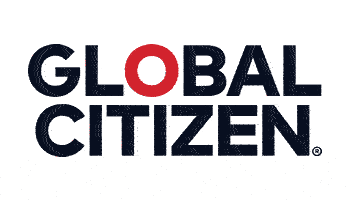
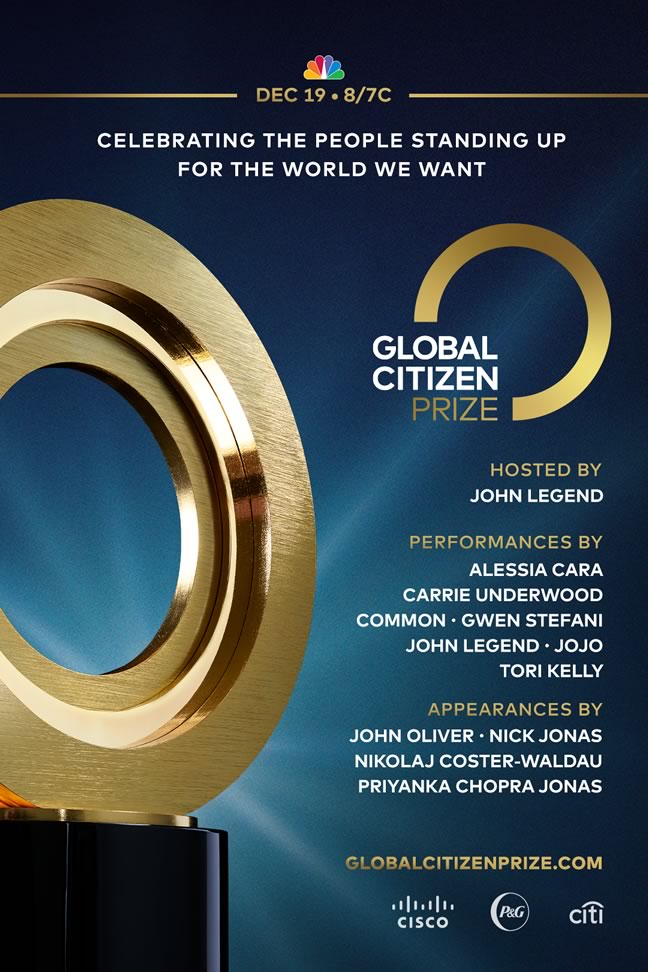

Photo: Guests pose in the audience during the Global Citizen Festival: Mandela 100 at FNB Stadium on December 2, 2018 in Johannesburg, South Africa. Image copyright © 2018 Getty Images. Photo by Jemal Countess/Getty Images for Global Citizen Festival: Mandela 100. Image provided by Global Citizen.

Photo: Jennifer Hudson performs during the Global Goal: Unite For Our Future - Summit & Concert on June 27, 2020. Photo by Getty Images for Global Citizen. Image provided by & copyright © 2020 Global Citizen.
New York, NY, December 10, 2020 — International advocacy organization Global Citizen today announced Alessia Cara, Carrie Underwood, Common, Gwen Stefani, John Legend, JoJo, and Tori Kelly would perform at the Global Citizen Prize award special on December 19, 2020. There would be appearances by John Oliver, Nick Jonas, Nikolaj Coster-Waldau, and Priyanka Chopra Jonas. John Legend will also serve as host of the broadcast event, which will celebrate and honor leaders who shape the world we want and do pivotal work to help end extreme poverty.
The Global Citizen Prize honors those making extraordinary efforts to lift the world’s most vulnerable and make the world a better place, and who inspire others to stand up and take action. The broadcast special will premiere on Saturday, December 19, 2020, at 8:00 P.M. ET on NBC in the United States and CTV in Canada. The Global Citizen Prize will also air on MSNBC on Saturday, December 19, 2020, at 10:00 P.M. ET, with a second airing on New Year’s Eve at midnight. Albavision in Central and Latin America, Digicel in The Caribbean, South Pacific and Central America, Insight TV in Asia, Europe, the Middle East, Mediacorp in Singapore, SABC in South Africa, and SKY Media in the United Kingdom would also air the award. TRACE Anglophone West Africa in Nigeria, Ghana and East Africa, MTV International on select channels in Africa, Asia, Europe, Latin America, and Vodafone in Europe, Africa, Oceania, and Asia would also broadcast the awards. The Global Citizen Prize show will also be available digitally on Facebook, Twitter, and YouTube following its airing on NBC.
The Countdown to the Prize digital pre-show, hosted by Access Hollywood’s Scott Evans, will feature exclusive behind-the-scenes interviews with the artists, special packages on the Prize winners, and a virtual red carpet, streaming at 7:30 P.M. ET on Facebook and Twitter.
Partners of the Global Citizen Prize include Cisco, P&G, and Citi. Global Citizen would present this year’s Global Citizen Prize across six categories:
Description:
Global Citizen of the Year: Celebrates an individual who has proven exceptional and sustained impact toward the end of extreme poverty and its systemic causes.
Global Citizen Prize for World Leader: Honors a political figure who advocates for and has implemented policy changes that have improved the lives of those living in poverty. Finalists for this year’s Prize include Chancellor of Germany Angela Merkel, Chairwoman & Managing Director of the IMF Kristalina Georgieva, President of the European Commission Ursula von der Leyen, and Executive Director of UNAIDS Winnie Byanyima.
Global Citizen Prize for Business Leader: Honors an individual in the business community who has combined business goals with positive human impact.
Global Citizen Artist of the Year: Honors a creative individual or group using their platform and their work to create change not only through conversation but meaningful impact.
Cisco Youth Leadership Award: Established by Cisco and Global Citizen, celebrates an individual aged 18-30 who has contributed meaningfully towards the goal of ending extreme poverty in their community. The award includes a $250,000 prize paid to the organization to which the individual contributes. This year’s finalists include Founder and President of Virtualahan, Ryan Gersava (Philippines); Founder and CEO of the Myna Mahila Foundation, Suhani Jalota (India); and Founder and Managing Director of Water Access Rwanda, Christelle Kwizera (Rwanda).
Global Citizen Country Hero Award: Celebrates individuals worldwide who have shown exceptional commitment to achieving the Global Goals and championing the most vulnerable. Global Citizen would present the award in Canada, the United Kingdom, Germany, Nigeria, South Africa, Australia, and Mexico.
Also, the Global Citizen Prize is introducing three other awards to recognize individuals or organizations who have demonstrated extraordinary impact over the preceding year, creating positive change and inspiring others through compassion, innovation, and unwavering dedication in their respective fields.
They include:
Global Citizen Prize for Philanthropy: Honors a philanthropist, or philanthropic group, who has shown extraordinary leadership, stepping forward to accelerate their giving in support of the world’s biggest challenges and in pursuit of achieving the United Nations Global Goals.
Global Citizen Prize for Culture & Education: Honors an individual or organization who has excelled in creating positive change through an artistic or educational endeavor.
Global Citizen Prize for Activism: Honors an individual or organization whose activism has driven significant and exemplary impact for society at a local or global level.
Since the first Global Citizen Festival in New York in 2012, Global Citizen has grown into one of the largest, most visible platforms for people worldwide. It calls on world leaders to honor their responsibilities in achieving the United Nations Sustainable Development Goals and ending extreme poverty by 2030. Global Citizens have mobilized $48.5 billion in commitments and policy announcements from leaders, and it has impacted the lives of 880 million people living in extreme poverty.
Source: Global Citizen
|GlobalGiants.Com|
Edited & Posted by the Editor | 4:47 AM | View the original post
Canada, Denmark, Italy, Japan, Singapore, UAE, and UK sign world’s first “Agile Nations” agreement at a panel co-organized by the World Economic Forum.
The agreement paves the way for the seven nations to help innovators navigate their rules, test new ideas with regulators, and scale them across their markets.
Collaboration builds on the World Economic Forum and OECD efforts to support more effective technological innovation regulation in the Fourth Industrial Revolution.
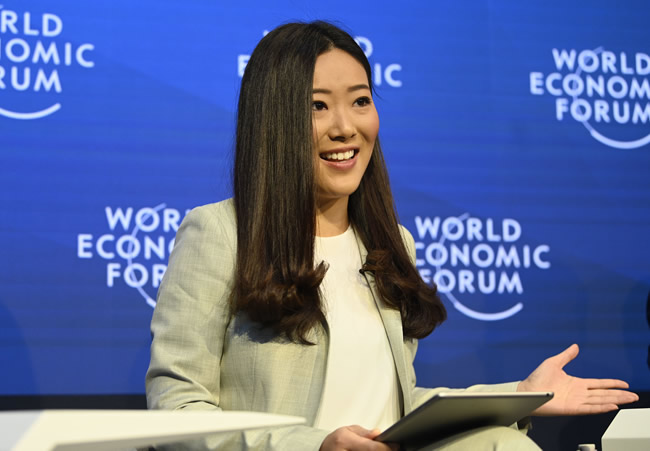
Photo: Olivia Chang, Anchor, CNNMoney Switzerland, Switzerland, speaking in Investing in the Next Digital Frontier session at the World Economic Forum Annual Meeting 2020 in Davos-Klosters, Switzerland, 24 January. Image provided by & copyright © World Economic Forum / Valeriano Di Domenico.
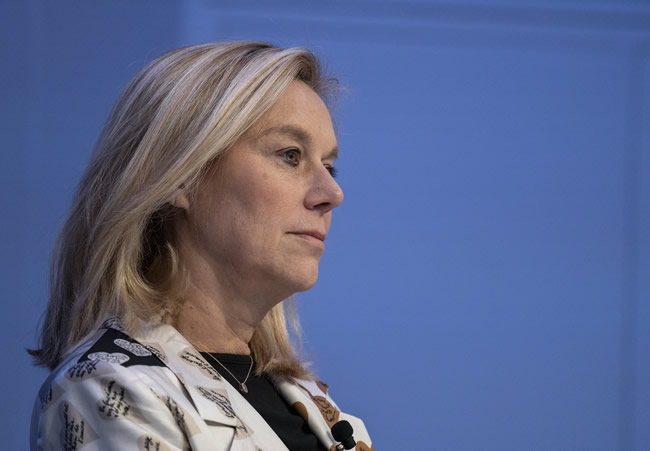
Photo: Sigrid Kaag, Minister for Foreign Trade and Development Cooperation of the Netherlands in the “The Return of Arab Unrest” session at the World Economic Forum Annual Meeting 2020 in Davos-Klosters, Switzerland, 23 January. Image provided by & copyright © World Economic Forum/Faruk Pinjo.
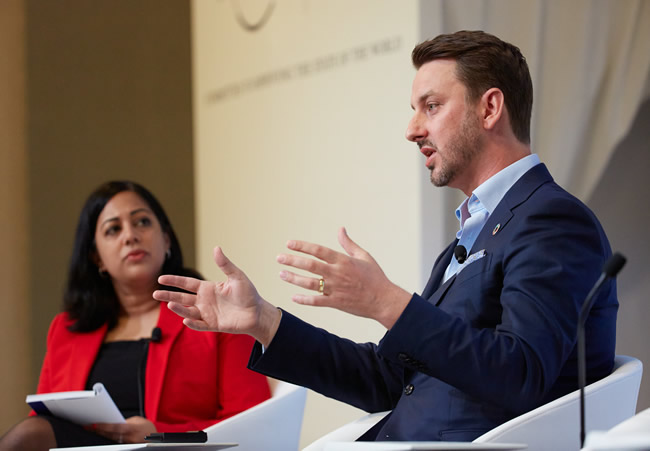
Photo: Participants speaking in the Ending Modern Slavery session at the World Economic Forum Annual Meeting 2020, Open Forum, in Davos-Klosters, Switzerland, 23 January. Image provided by & copyright © World Economic Forum/ Patrick Somelet.
Geneva, Switzerland, 9 December 2020 - The COVID-19 pandemic has wrought economic and social disruption worldwide. As people and businesses focus on recovery, governments must ensure that outdated regulations do not hold back innovation that will power economic growth and solve the world’s most pressing social and environmental challenges.
World Economic Forum and the Organisation for Economic Co-operation and Development (OECD) organized a panel for Agile Nations. The ministers from Canada, Denmark, Italy, Japan, Singapore, United Arab Emirates, and the United Kingdom announced their plan to lead the world in fostering responsible innovation and entrepreneurship. The Agile Nations Charter sets out each country’s commitment to creating a regulatory environment in which new ideas can thrive.
In a world-first, the agreement paves the way for the nations to cooperate in helping innovators navigate each country’s rules, test new ideas with regulators, and scale them across the seven markets. Priority areas for cooperation include the green economy, mobility, data, financial and professional services, and medical diagnosis and treatment.
The collaboration results from the World Economic Forum’s project on Agile Regulation for the Fourth Industrial Revolution.
The World Economic Forum today published its guide to better regulation of emerging technologies, developed in partnership with the Global Future Council on Agile Governance.
The OECD launched the development of principles on effective and innovation-friendly rulemaking in the Fourth Industrial Revolution for its 37 member states, to be adopted in 2021.
“Too often, rules and laws are designed with the past in mind,” said Murat Sönmez, Managing Director, World Economic Forum. “Our Centres for the Fourth Industrial Revolution help governments, businesses, and citizens co-design for the future - enabling the innovation that will be needed to create jobs, maintain competitiveness, and ensure resilience to shocks. We’re excited to work with the new Agile Nations network.”
“Against a backdrop of a once-in-a-century global health and economic crisis, governments need to undertake a paradigm shift in their rulemaking activities,” said Jeffrey Schlagenhauf, Deputy Secretary-General, OECD. “To help governments navigate the challenges and develop more agile approaches to the regulatory governance of innovation, the OECD is developing principles on effective and innovation-friendly rulemaking in the Fourth Industrial Revolution. The Agile Nations network is an extremely timely initiative to truly foster international regulatory cooperation for better, innovation-friendly, and up-to-date regulations worldwide.”
“The UK has a proud history of entrepreneurship and discovery, but it is only by working together internationally that we can truly unleash the incredible potential of new technology,” said Martin Callanan, Business Minister, United Kingdom. “The Agile Nations will boost collaboration to remove regulatory barriers, ensuring innovators and entrepreneurs can market and scale their innovations across all seven nations involved, and I urge other countries to join this important initiative.”
“Canada’s endorsement of the Agile Nations agreement demonstrates our commitment to creating a regulatory environment where innovation can flourish. And our respective businesses can be more efficient and competitive globally,” said Jean-Yves Duclos, President of the Treasury Board of Canada. “Canada is ready to play its part in sharing ideas and best practices on agile regulation.”
“As an international company, Siemens has always supported cross-border collaboration,” said Torsten Ende, Head of Government Affairs, Siemens. “Cross-border collaboration of regulators is the best way to avoid unnecessary divergence that could hamper innovation and to ensure future-oriented cooperation and technology with purpose. The proposed Agile Nations network, which fosters cooperation on rulemaking, is a great step in the right direction.”
“Regulatory agility, strong business-government partnerships, and constructive international regulatory cooperation are key in enabling innovation and helping businesses to emerge stronger from the COVID-19 pandemic,” said Low Yen Ling, Minister of Trade and Industry, Singapore. “Singapore looks forward to working closely with the Agile Nations network to strengthen collaboration in agile regulation to enable businesses and emerging innovations to rapidly scale up, offer new solutions, and drive greater growth.”
“We fully support this Agile Nations network as an initiative to promote international cooperation regarding the concept of ‘governance innovation’ agreed at the 2019 G20 Ministerial Meeting held in Japan. We are happy to share our experiences and knowledge about innovative governance, including projects of the Digital Architecture Design Centre established this year,” said Kouichi Munekiyo, Parliamentary Vice-Minister, Ministry of Economy, Trade, and Industry of Japan.
“IBM is pleased to support the Agile Nations initiative,” said Christopher Padilla, Vice-President, Government, and Regulatory Affairs, IBM. “Even as breakthroughs in technology are creating immense opportunities and improving economic and social well-being, these innovations are challenging traditional models of regulation. Promoting agile governance is a key mechanism for ensuring we reap technology’s benefits while mitigating risks. The Agile Nations Charter is an important step in fostering the international cooperation necessary to deliver on the promises of the Fourth Industrial Revolution.”
“Sperimentazione Italia (Italy Experimentation) allows companies, universities, and research institutions to experiment with frontier innovations, so that disruptive innovations’ opportunities are not missed. The time is ready to extend and apply the testing of ‘agile regulation’ within the international cooperation among countries,” said Paola Pisano, Minister of Technological Innovation, Italy.
“The UAE government is proud to endorse the Agile Nations network. It would help adopt agile governance and innovation to build strong, capable, and resilient governments. It would enable them to tackle future challenges with proactive solutions,” said Ohood Bint Khalfan Al Roumi, Minister of State for Government Development the Future, United Arab Emirates.
“New technologies can accelerate the transition to a more green and sustainable society,” said Katrine Winding, Director-General, Danish Business Authority. “However, regulatory and other barriers currently prevent start-ups and innovative SMEs in particular from bringing their ideas to market. Through innovation-friendly regulation, we will support the testing and developing of new solutions, ensuring equal competition, and protecting our citizens and the environment. It is no simple task. Denmark looks forward to addressing key challenges through the Agile Nations network.”
Source: World Economic Forum
|GlobalGiants.Com|
Edited & Posted by the Editor | 4:14 AM | View the original post

Photo: 2020 White House Christmas. The Cross Hall of the White House is decorated for the Christmas season Sunday, Nov. 29, 2020. (Official White House Photo by Andrea Hanks).

Photo: 2020 White House Christmas. First Lady Melania Trump reviews the Christmas decorations Sunday, Nov. 29, 2020, in the Cross Hall of the White House. (Official White House Photo by Andrea Hanks).

Photo: The White House Christmas Tree Arrival. First Lady Melania Trump receives the White House Christmas Tree Monday, Nov. 23, 2020, at the North Portico of the White House. (Official White House Photo by Andrea Hanks).
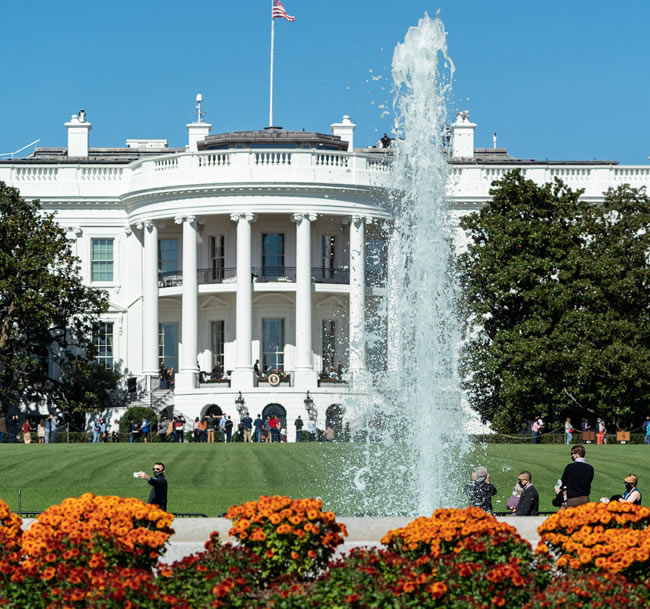
Photo: The White House 2020 Fall Garden Tours. Guests attend the Fall Garden Tours Sunday, Oct. 18, 2020, on the White House’s South Lawn. (Official White House Photo by Andrea Hanks).
Source: The White House
|GlobalGiants.Com|
Edited & Posted by the Editor | 9:17 AM | View the original post
Gitanjali Rao, 15, is Recognized as the 2020 Kid of the Year for Her Mission to Create a Global Community of Young Innovators to Solve the World’s Biggest Problems.
Kid of the Year TV Special, Hosted by Trevor Noah and Produced by TIME Studios, to Simulcast on Nickelodeon, TV Land, TeenNick, and Nicktoons on Friday, Dec. 4.
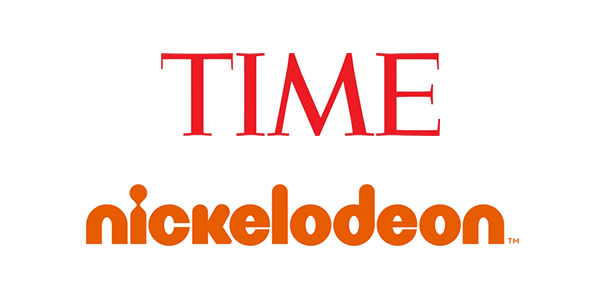
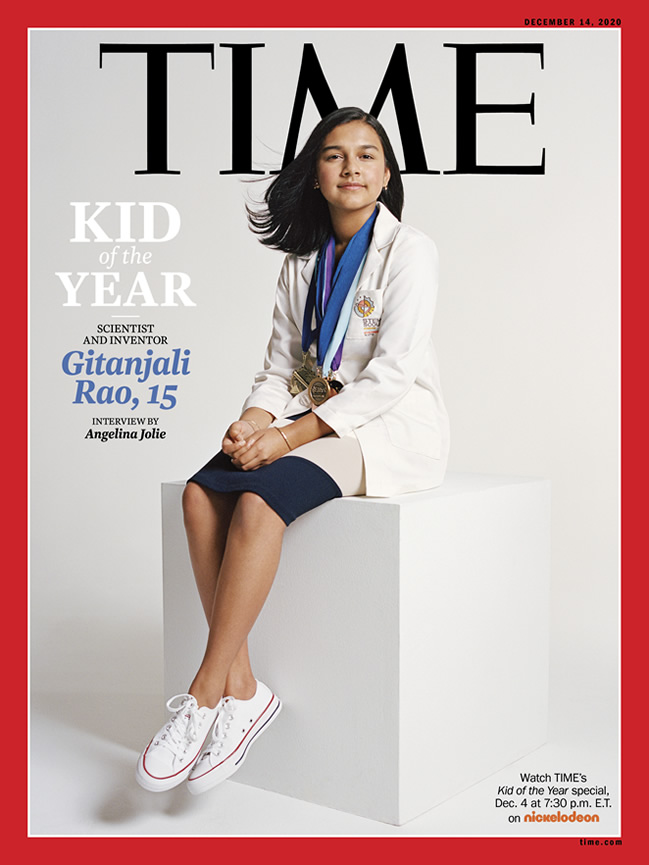
NEW YORK, Dec. 3, 2020 — TIME, TIME for Kids, and Nickelodeon announced 15-year-old scientist and inventor Gitanjali Rao from Colorado as the 2020 Kid of the Year, the multiplatform initiative recognizing extraordinary young leaders who are making a positive impact in their communities.
Selected from a field of more than 5,000, 2020 Kid of the Year Gitanjali Rao is featured on the Dec. 14 cover of TIME, available on newsstands on Friday, Dec. 4.
In an interview with Angelina Jolie for TIME, Rao spoke about her work using technology to tackle issues ranging from contaminated drinking water to opioid addiction and cyberbullying: “I don’t look like your typical scientist. Everything I see on TV is that it’s an older, usually white man as a scientist. It was almost like people had assigned roles regarding their gender, age, and skin color. My goal has shifted from creating my own devices to solve the world’s problems and inspiring others to do the same. Because, from personal experience, it’s not easy when you don’t see anyone else like you. So I want to put out that message: If I can do it, you can do it, and anyone can do it.”
Kid of the Year Gitanjali Rao, alongside the other top finalists and honorees, will be recognized during the first-ever Kid of the Year TV special, hosted by Trevor Noah. The special will simulcast across Nickelodeon, TV Land, TeenNick, and Nicktoons on Friday, Dec. 4.
The Kid of the Year TV special will feature guest stars from entertainment, sports, and pop culture to surprise the top five Kid of the Year honorees and celebrate their work. Celebrity guests making appearances throughout the special include Kristen Bell, Simone Biles, Dixie D’Amelio, Billie Eilish, Rob Gronkowski, Neil Patrick Harris, Chris Hemsworth, Ken Jeong, Angelina Jolie, Chloe Kim, Brie Larson, Zachary Levi, Russell Westbrook, and Malala Yousafzai, among others.
Each of the top five Kid of the Year honorees will receive a cash prize from Nickelodeon and have the opportunity to serve as a Kid Reporter for TIME for Kids with exclusive access to a Nickelodeon event.
Nickelodeon’s Kid of the Year TV special is a co-production of TIME Studios, Day Zero Productions, Mainstay Entertainment, and Nickelodeon.
TIME is a global media brand that reaches a combined audience of more than 100 million worldwide, including over 40 million digital visitors each month and 45 million social followers.
Nickelodeon, now in its 41st year, is the number-one entertainment brand for kids. It has built a diverse, global business by putting kids first in everything it does. The brand includes television programming and production in the United States and worldwide, plus consumer products, digital, location-based experiences, publishing, and feature films.
Source: TIME
|GlobalGiants.Com|
Edited & Posted by the Editor | 8:54 AM | View the original post
• Lindsey Coffey from Pennsylvania bests 83 candidates at the 20th-anniversary coronation.

Photo: Miss Earth 2020. Lindsey Coffey of Pennsylvania, USA.
WASHINGTON, December 2, 2020 — On November 29, Lindsey Coffey of Pennsylvania became the first American representative to be crowned as Miss Earth during the 20th-anniversary coronation.
Based in the Philippines, Miss Earth® is the only major international pageant to hold an event during 2020, opting to host a two-month-long series of virtual online events. “We decided not to skip this year so we can continue with our mission to raise awareness on the state of the environment,” Lorraine Schuck, Carousel Productions executive vice-president and Miss Earth co-founder, said in a statement earlier this year.
Advocating Beauty for a Cause™, Miss Earth empowers women through community leadership, eco-tourism, and environmental education. It is recognized as the globe’s most relevant pageant and has been named best national pageant by several American media networks.
Coffey, 28, was a successful college track athlete and completed a pre-law curriculum at Washington and Jefferson College in Pennsylvania. She earned a Bachelor’s degree in political science before entering a successful modeling career in New York and other major cities worldwide. She plans to continue her goal to pursue law school following her year as Miss Earth.
Following the announcement, Coffey said, “I joined the Miss Earth sisterhood to become a voice, to inspire, and to make a difference in our world. Now is that opportunity, as now is the time for action. Now is the time to be more than in your country. We are not just citizens of our nation. We are citizens of the world, and once we start to view one another as such, we will always find success. As your Miss Earth, that is the legacy I will leave behind me.”
Miss Earth is unique in that it also crowns three elemental international titleholders to carry out the organization’s mission in their regions. Miss Air is Stephany Zreik of Venezuela, Miss Water is Roxanne Allison Baeyens of the Philippines, and Miss Fire is Michala Rubinstein of Denmark. The remaining finalists were Myanmar’s Amara Shune Lei, Netherlands’ Tessa le Conge, Puerto Rico’s Krystal Badillo, and Poland’s Sabina PoÅ‚tawska. Eighty-four national representatives participated in activities.
This week, Coffey will conduct several international media interviews and appear on December 5 at a congratulatory reception. Plans are underway for an official crowning by 2019 Miss Earth Nellys Pimentel of Puerto Rico. The next USA representative will get crowned on January 17 in Orlando.
Source: Miss Earth
|GlobalGiants.Com|
Miss Earth 2020 Eco Angel of the USA.
Miss Earth 2020 Eco Angel of the Philippines.
Edited & Posted by the Editor | 6:01 AM | View the original post
• Digital Intelligence Index from The Fletcher School at Tufts University and Mastercard provides an in-depth look at the rate of technology adoption and the state of digital trust around the world.
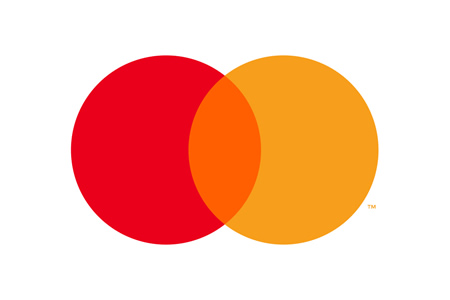
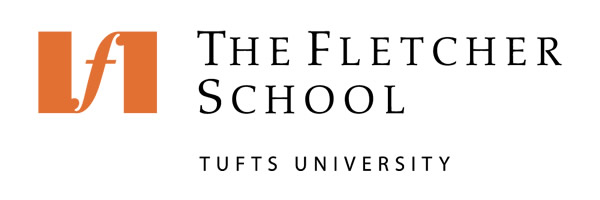
Purchase, NY & Medford, MA. December 01, 2020 — The Fletcher School at Tufts University, in partnership with Mastercard, unveiled the Digital Intelligence Index. It charts the progress countries have made in advancing their digital economies, fostering trust, and integrating connectivity into the lives of billions.
This year’s index paints a picture of global digital development, sheds insight on key factors driving change and momentum, and unpacks what this means for economies facing the challenges of a worldwide pandemic and post-pandemic future.
Notably, the most dynamic digital economies - such as the United States, South Korea, Taiwan, UAE, and Germany - significantly outperformed the OECD (Organisation for Economic Co-operation and Development) growth rate in Q2 2020 amidst the global lockdown. They feature high levels of available talent, active R&D collaboration between industry and academia, and a strong record of creating and bringing digital products into the mainstream.
Bhaskar Chakravorti, Dean of Global Business at The Fletcher School, said, “The pandemic may be the purest test of the world’s progress towards digitalization. We have a clearer view of how dynamic digital economies can contribute to economic resiliency during a time of unparalleled global turmoil and can recover and change.”
Other key findings include:
With nearly two-thirds of the world’s population online today, we are entering an ‘after access’ phase, where access alone is not enough. Aspects such as the quality of access, effective use of digital technologies, accountable institutions, robust data governance policies, and fostering trust are more excellent factors in determining digital competitiveness and sustainability.
Ajay Bhalla, president, Cyber & Intelligence, Mastercard, said, “Never before has there been such an acute need to understand the factors that drive digitalization and digital trust. With that knowledge, businesses and governments can work together to help all 7.6 billion people worldwide benefit from the vast opportunities a digitally advanced economy can bring. While much remains uncertain today, it is clear that digital success will be a key building block in our collective recovery.”
A Global Outlook on Digital Evolution and Trust
This year’s index looks at two components: Digital Evolution and Digital Trust. Digital Evolution captures an economy’s historical momentum from the physical past to the digital present. Digital Trust is the bridge that connects its journey from the digital present to an intelligent and inclusive digital future.
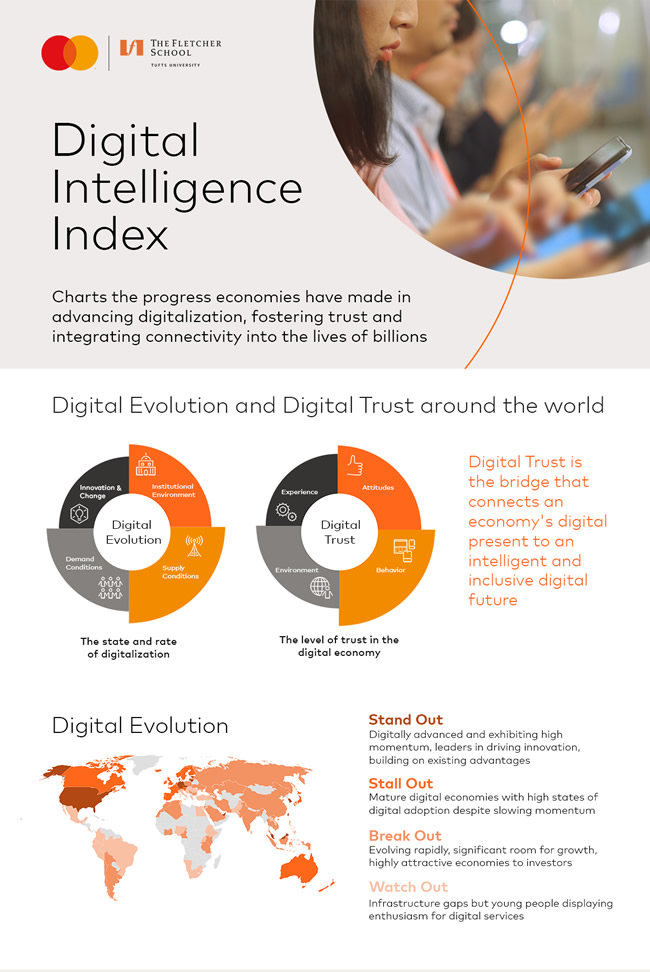
Mapping 95% of the world’s online population and drawing on 12 years of data, the Digital Evolution scorecard measures 160 indicators in 90 economies across four key pillars: institutional environment, demand conditions, supply conditions, and the capacity for innovation and change. These segment into four categories:
Stand Out economies - Singapore, United States, Hong Kong, South Korea, Taiwan, Germany, Estonia, UAE, Israel, Czech Republic, Malaysia, Lithuania, and Qatar - are highly digitally advanced and exhibit high momentum. They are leaders in driving innovation, building on their existing advantages in efficient and effective ways.
Stall Out economies - such as Sweden, United Kingdom, Netherlands, Japan, and Canada - are mature digital economies with a high digital adoption state despite slowing digital momentum. They tend to trade off sustainability speed.
Break Out economies - such as China, India, Indonesia, Poland, and Russia - are evolving rapidly. With such momentum and significant headroom for growth, they are often attractive to investors.
Watch Out economies - such as Nigeria, Uganda, Colombia, Peru, Pakistan, and Sri Lanka - have several infrastructure gaps. Despite this, young people show enthusiasm for a digital future with increased social media and mobile payments.
The Digital Trust scorecard measures 198 indicators in 42 of the index’s economies across four key pillars: behavior, attitudes, environment, and experience.
Economies such as Brazil, Colombia, and Mexico are beginning to build momentum on behavior scores, demonstrating substantial engagement on social media and other new technologies.
Economies such as China, Indonesia, and Vietnam have increasingly favorable attitudes about their digital future, buoyed by rapidly expanding digital adoption and opportunity.
Economies with more mature digitalization approaches such as Sweden, the Netherlands, and Denmark share measures that strengthen the trust environment, such as privacy, security, and accountability policies. Citizens in these countries tend to have more optimistic attitudes towards the future of digitalization.
Economies such as the United States, Hong Kong, Taiwan, South Korea, and Singapore provide citizens with a near-seamless experience, delivering the holy grail of advanced infrastructure, broad access, and unparalleled interaction. This experience is matched by high engagement levels, offering these economies a clear advantage in a ‘beyond access’ future.
Source: Mastercard
|GlobalGiants.Com|
Edited & Posted by the Editor | 11:48 AM | View the original post
The world has experienced unimaginable hardship since the global pandemic outbreak, reversing gains in the fight against unemployment, climate change, and poverty.
Rebuilding trust and increasing global cooperation are crucial to implementing the bold and innovative solutions needed to drive a robust recovery.
To mobilize government, business, and civil society on these solutions, the World Economic Forum will hold a virtual meeting on 25-29 January 2021 on the Davos Agenda.
Heads of state and government will address the state of the world in 2021 to audiences in Asia, Europe, Africa, the Middle East, North America, and Latin America.
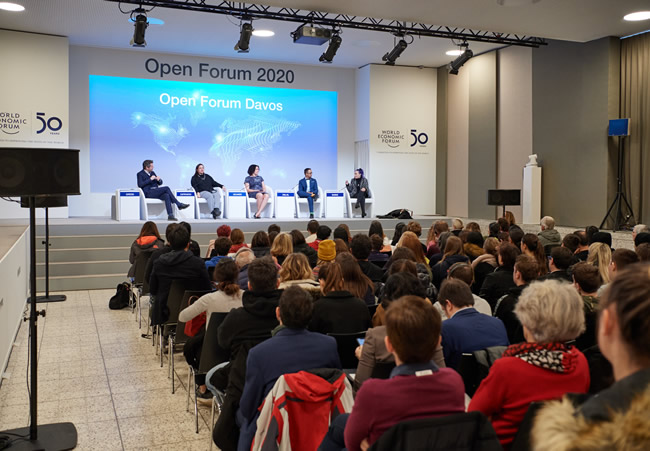
Photo: Participants in the Digital Safety for Youth session at the World Economic Forum Annual Meeting 2020, Open Forum, in Davos-Klosters, Switzerland, 24 January. Swiss Alpine High School Auditorium. Image provided by @ copyright World Economic Forum/ Marc Forzi.
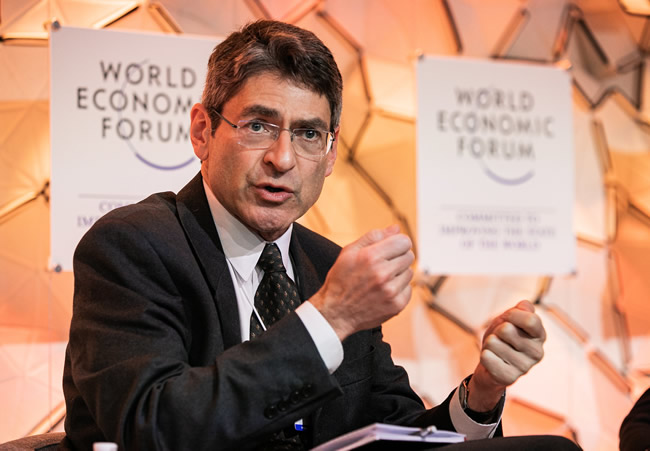
Photo: Jonathan Haskel, Professor of Economics, Imperial College London, United Kingdom, speaking during the session Accounting for Human Capital at the World Economic Forum Annual Meeting 2020 in Davos-Klosters, Switzerland, 24 January. Congress Centre - in Salon. Image provided by @ copyright World Economic Forum/Jakob Polacsek.
Geneva, Switzerland, 23 November 2020 - The Davos Agenda is a pioneering mobilization of global leaders to rebuild trust to shape the principles, policies, and partnerships needed in 2021. The virtual meeting will build momentum ahead of the Special Annual Meeting in the spring. The Davos Agenda will feature a full week of global programming on 25-29 January 2021 with the participating heads of state, CEOs, civil society leaders, international media, and youth leaders from Asia, Europe, Africa, the Middle East, North America, and Latin America.
“2021 is a crucial year to rebuild trust,” said Professor Klaus Schwab, Founder and Executive Chairman of the World Economic Forum. “The world is at a crossroads. The pandemic has reversed essential gains in the global fight against unemployment, climate change, and poverty. Leaders must come together for decisive and inclusive action.
Building a better future for work, accelerating stakeholder capitalism, and harnessing the technologies of the Fourth Industrial Revolution will be essential topics on the Davos Agenda.
The five program themes are:
Designing cohesive, sustainable, resilient economic systems (25 January).
Driving responsible industry transformation and growth (26 January).
Enhancing the stewardship of our global commons (27 January).
Harnessing the technologies of the Fourth Industrial Revolution (28 January).
Advancing global and regional cooperation (29 January).
Heads of state and government and international organizations will give addresses on the state of the world and engage in dialogue with business leaders. Industry leaders and public figures will discuss how to advance and accelerate public-private collaboration on critical issues such as COVID-19 vaccination, job creation, and climate change, among others. The Forum’s core communities, including its International Business Council, will share their insight and recommendations from global, regional, and industry initiatives in impact sessions.
The World Economic Forum further announced that the high-level agenda-setting dialogues that characterize the Forum’s January meeting will occur throughout the week and will be live-streamed - providing more opportunities for the public to engage. Sessions will occur across Beijing, Geneva, New York, San Francisco, and Tokyo time zones to ensure global participation, the Forum stated.
Source: World Economic Forum
|GlobalGiants.Com|
Edited & Posted by the Editor | 9:18 AM | View the original post

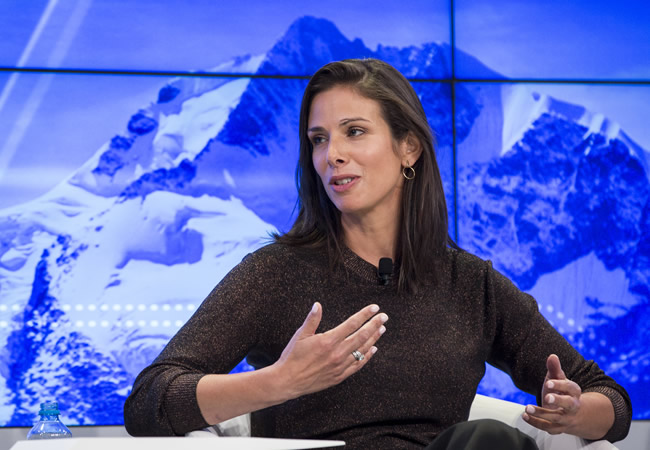
Photo: Rachel Botsman, Visiting Academic and Lecturer, Saïd Business School, University of Oxford, United Kingdom, speaking during the Session “In Technology We Trust?” at the Annual Meeting 2018 of the World Economic Forum in Davos, January 23, 2018. Image provided by & Copyright World Economic Forum / Faruk Pinjo.
Oxford, November 23, 2020 — The University of Oxford, in collaboration with AstraZeneca plc, today announced interim trial data from its Phase III trials that show its candidate coronavirus vaccine, ChAdOx1 nCoV-2019, is effective at preventing COVID-19 (SARS-CoV-2) and offers a high level of protection.
An early indication that the vaccine could reduce virus transmission from an observed reduction in asymptomatic infections.
There were no hospitalized or severe cases in anyone who received the vaccine. Extensive safety database from over 24,000 volunteers from clinical trials in the UK, Brazil, and South Africa, with follow up since April.
Crucially, the vaccine can be easily administered in existing healthcare systems, stored at ‘fridge temperature’ (2-8 °C), and distributed using existing logistics.
Large-scale manufacturing ongoing in over ten countries to support equitable global access.
Professor Andrew Pollard, Director of the Oxford Vaccine Group and Chief Investigator of the Oxford Vaccine Trial, said:
Professor Sarah Gilbert, Professor of Vaccinology at the University of Oxford, said:
Following the trial reaching the target for interim analysis, the independent Data and Safety Monitoring Board (DSMB) recommended that the Oxford team conduct its first analysis on all the cases with data locked on November 4, 2020.
Additional cases may accrue by the time of the final analysis, and future studies will determine the duration of protection. No severe safety events related to the vaccine have been identified.
Oxford will now support AstraZeneca in submitting both the interim Phase III efficacy data and the extensive safety data to all regulators globally, including in the UK, Europe, and Brazil, for independent scrutiny and product approval, and emergency use. Many of these regulators have been reviewing the trial data on a rolling basis during the trial.
In parallel, Oxford is submitting the full analysis of Phase III interim data for independent scientific peer review and publication.
The interim Phase III data builds on Oxford’s phase I/II peer-reviewed trial results, showing that the vaccine induces potent antibody and T cell immune responses across all age groups and has a good safety profile.
The clinical trials, enrolling over 24,000 participants from diverse racial and geographical groups in the UK, Brazil, and South Africa will continue to final analysis. Trial teams are conducting further tests in the United States, Kenya, Japan, and India. The trial unit expects to have 60,000 participants by the end of the year. These trials will provide regulators with further information about the Oxford candidate vaccine’s efficacy and safety, including its ability to protect against and stop the transmission of COVID-19.
The Oxford vaccine (ChAdOx1 nCoV-19) is made from a virus, a weakened version of a common cold virus (adenovirus), that has been genetically changed so that it can’t grow in humans.
Adenovirus vaccines have been researched and used extensively for decades and have a unique benefit: they are stable, easily manufactured, transported, and stored at domestic fridge temperature (2-8 degrees C). It means they can be easily distributed using existing medical facilities such as doctor’s surgeries and local pharmacies, allowing for the vaccine, if approved, to be deployed very rapidly.
Oxford University’s collaboration with AstraZeneca has been crucial to the successful development of the vaccine and vital for its global manufacturing and distribution across the world. AstraZeneca already has international agreements to supply three billion doses of the vaccine, with access being built through more than 30 supply agreements and partner networks.
A key element of Oxford’s partnership with AstraZeneca is the joint commitment to provide the vaccine on a not-for-profit basis for the duration of the pandemic across the world and in perpetuity to low and middle-income countries.
Professor Louise Richardson, Vice-Chancellor of the University of Oxford, said:
Source: The University of Oxford
|GlobalGiants.Com|
Oxford University’s ‘Vaccine for the World’ is Effective.
• Prime Minister Modi visits Serum Institute of India, Pune.
The Serum Institute of India is the manufacturing partner of the Oxford vaccine. The Pune-based firm has selected 17 sites in India, including PGI Chandigarh, to conduct the trial. A total of 1,600 candidates are taking part in the study.
Prime Minister Narendra Modi visited Serum Institute of India, Pune, on November 28, 2020, and interacted with the team at the Institute. In a tweet, the Prime Minister said, “Had a good interaction with the team at Serum Institute of India. They shared details about their progress so far on how they plan to ramp up vaccine manufacturing further. Also took a look at their manufacturing facility.”
Had a good interaction with the team at Serum Institute of India. They shared details about their progress so far on how they plan to further ramp up vaccine manufacturing. Also took a look at their manufacturing facility. pic.twitter.com/PvL22uq0nl
— Narendra Modi (@narendramodi) November 28, 2020
— The Editor holds an Oxford Alumni Card and is a Member of the Oxford and Cambridge Society of India.
Edited & Posted by the Editor | 8:40 AM | View the original post
 |
 |
